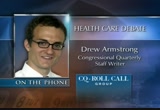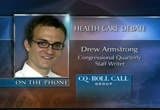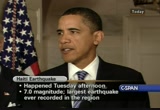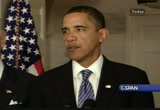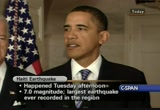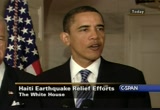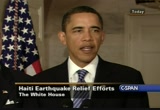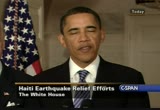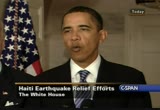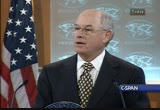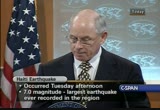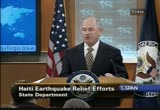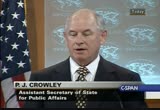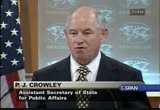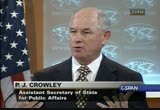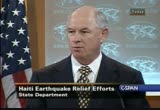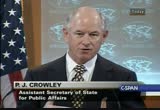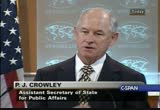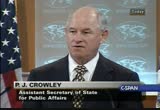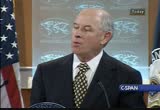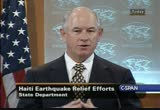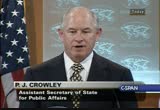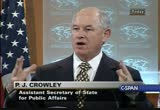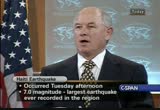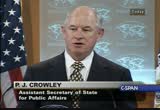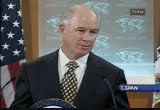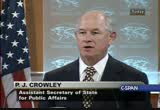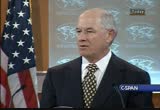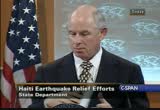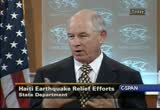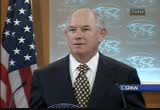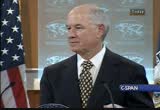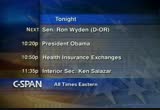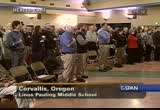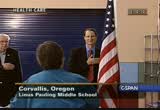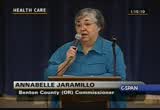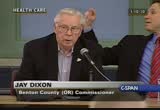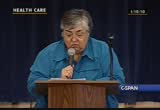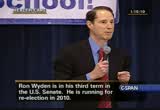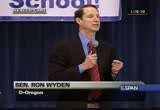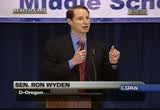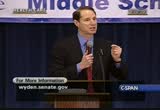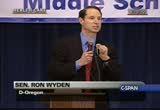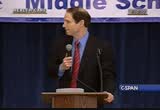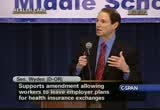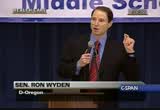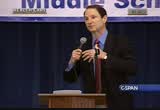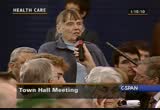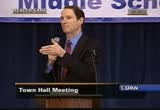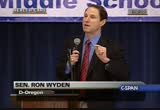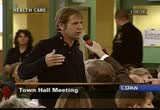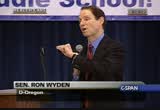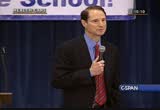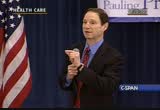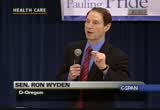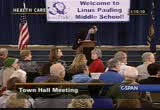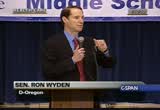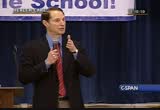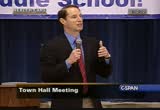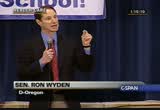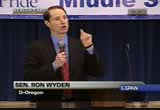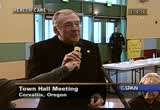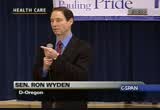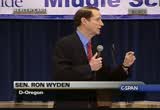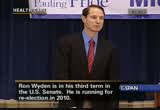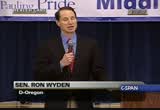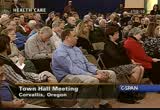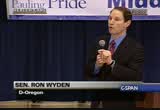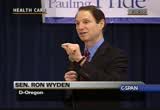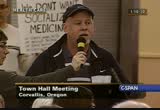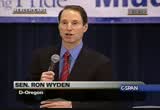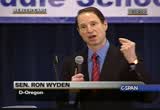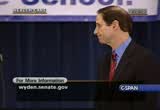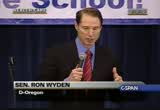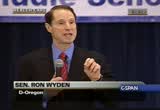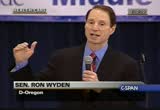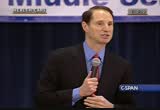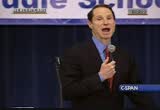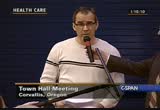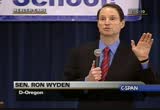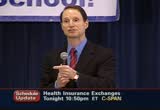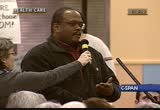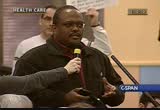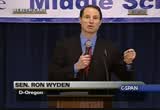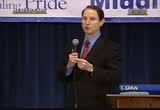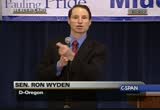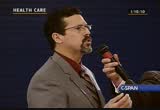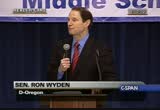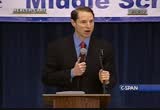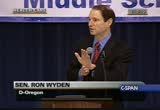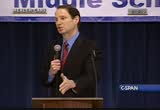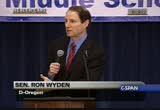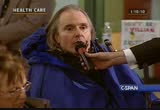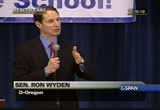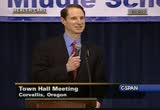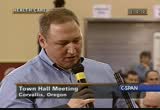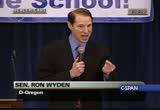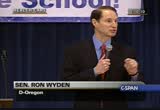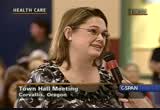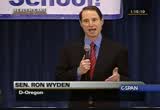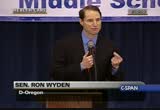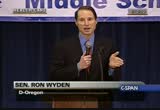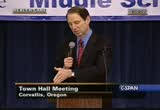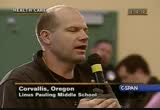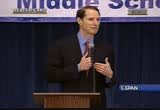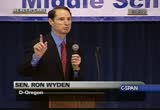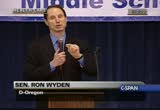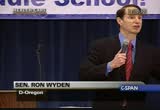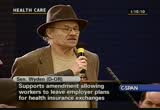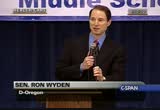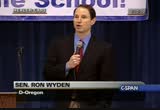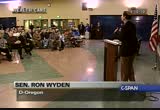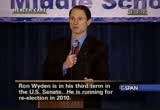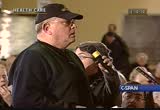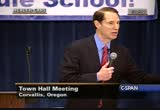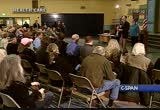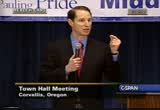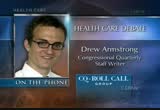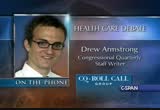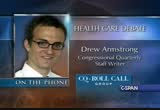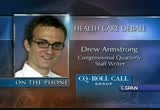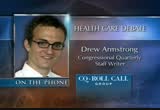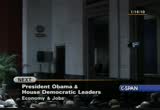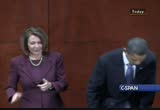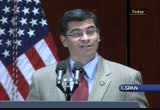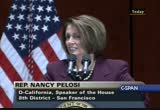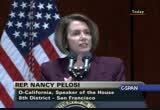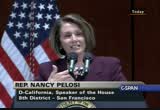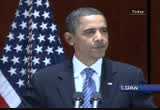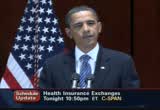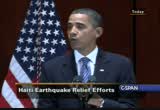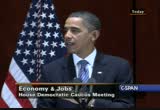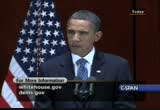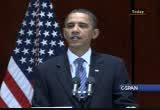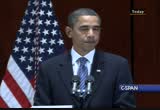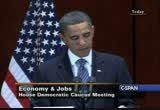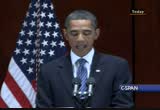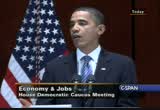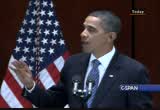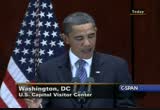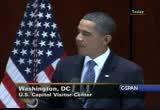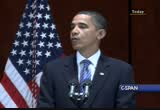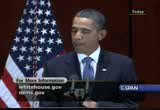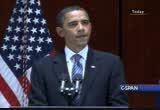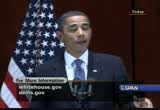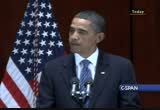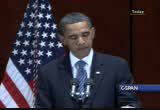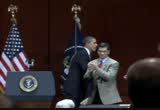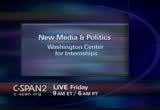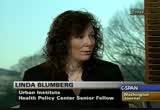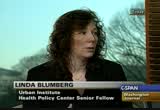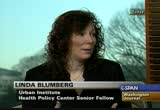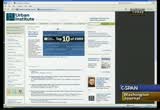tv Tonight From Washington CSPAN January 14, 2010 8:00pm-11:00pm EST
8:00 pm
wage increases in order to get more generous packages. the campaign promises have been to not tax middle class americans. in the narrowest form, this could be aimed at wealthy workers or wealthy executives getting overly generous benefit packages. >> what >> so, what other major hurdles may still be out there to overcome between the house and senate bills? >> the white house has said that they think this was the biggest one. there are some political hurdles on the horizon, like resolving w3differences an abortion langue and the bill, what to do about the public plan. those political issues aside, everything comes down to money, and this was the money issue. now that seems to be heading on
8:01 pm
his way to being out of the way. this greases the wheels for a lot of other things to fall into place in the next 24-48 hours. we're going to see a lot of deal making and agreements announced during that period. >> drew armstrongok of "congressional quarterly," thanks for joining us. [captioning performed by national captioning institute] [captions copyright national cable satellite corp. 2010] >> coming up tonight on c-span, president obama discusses u.s. relief efforts toq+h help earthquake victims in haiti. then more details on the situation in haiti from the state department. that is followed by a health care town hallq meeting hmlw by oregon senator ron wyden. >> did you know that the number one free news app for i found it is c-span radio? you can get easy access to three streaming audio channels, c-span radio, plus c-span and c-span-2.
8:02 pm
çthere are links to all of our podcast. and it is all free and available from the appççç store. >>ç president obama pledged one under million dollars for earthquake relief efforts in haiti -- $100 million dollars in relief efforts for haiti. we will pledge more aid is relief efforts continue. this is seven minutes. >> good morning, everybody. i've directed my administration to launch a swift, coordinated and aggressive effort to save lives and support the recovery in haiti. the losses that have been suffered in haiti are nothing less than devastating, andçó responding to a disaster of this magnitude will require every element of our national capacity -- our diplomacy and
8:03 pm
development assistance -- the power of our military; and, most importantly, the compassion of our country. and this morning, i'm joined by several members of my national security team who are leading this coordinated response. i've made it clear to each of these leaders that haiti mustw3 be a top priority for their departments and agencies right now. this is one of those moments that calls out for american leadership. for the sake of our citizens who are in haiti, for the sake of the haitian people who have suffered so much, and for the sake of our common humanity, we stand in solidarity with our neighbors to the south, knowing that but for the grace of god, there we go. this morning, i can report that the first waves of our rescue and relief workers are on the ground and at work. a survey team worked overnight to identify priority areas for assistance, and shared the results of that review throughout the united states
8:04 pm
government, and with international partners who are also sending support. search and rescue teams are actively working to save lives. our military has secured the airport and prepared it to receive the heavy equ[pment and resources that are on the way, and to receive them around the clock, 24 hours a day. an airlift has been set up to deliver high-priority items like water and medicine. and we're coordinating closely with the haitian government, the united nations, and other countries who are also on the ground. we have no higher priority than the safety of american citizens, and we've airlifted injured americans out of haiti. we're running additional evacuations, and will continue to do so in the days ahead. i know that many americans, especially haitian americans, are desperate for information about their family and friends. and the state department has set up a phone number and e-mail address that you can find at www.state.gov -- www.state.gov -- to inquire about your loved ones.
8:05 pm
and you should know that we will not rest until we account for our fellow americans in harm's way. even as we move as quickly as possible, it will take hours -- and in many cases days -- to get all of our people and resources on the ground. right now in haiti roads are impassable, the main port is badly damaged, communications are just beginning to come online, and aftershocks continue. none of this will seem quick enough if you have a loved one who's trapped, if you're sleeping on the streets, if you can't feed your children. but it's important that everybody in haiti understand, at this very moment one of the largest relief efforts in our recent history is moving towards haiti. more american search and rescue teams are coming. more food. more water. doctors, nurses, paramedics. more of the people, equipment and capabilities that can make the difference between life and death. the united states armed forces are also on their way to support
8:06 pm
this effort. several coast guard cutters are already there providing everything from basic services like water, to vital technical support for this massive logistical operation. elements of the army's 82nd airborne division will arrive today. we're also deploying a marine expeditionary unit, the aircraft carrier uss carl vinson, and the navy's hospital ship, the comfort. and today, i'm also announcing an immediate investment of $100 million to support our relief efforts. this will mean more of the life- saving equipment, food, water and medicine that will be needed. this investment will grow over the coming year as we embark on the long-term recovery from this unimaginable tragedy. the united states of america will also forge the partnerships that this undertaking demands. we will partner with the haitian people. and that includes the government of haiti, which needs our support as they recover from the devastation of this earthquake. it also includes the many haitian americans who are
8:07 pm
determined to help their friends and family. and i've asked vice president biden to meet in south florida this weekend with members of the haitian american community, and with responders who are mobilizing to help the haitian people. we will partner with the united nations and its dedicated personnel and peacekeepers, especially those from brazil, who are already on the ground due to their outstanding peacekeeping efforts there. and i want to say that our hearts go out to the united nations, which has experienced one of the greatest losses in its history. we have no doubt that we can carry on the work that was done by so many of the u.n. effort that have been lost, and we see that their legacy is haiti's hope for the future. we will partner with other nations and organizations. and that's why i've been reaching out to leaders from across the americas and beyond who are sending resources to support this effort. and we will join with the strong network of non- governmental organizations across the country who understand the daily struggles of the haitian people.
8:08 pm
yet even as we bring our resources to bear on this emergency, we need to summon the tremendous generosity and compassion of the american people. i want to thank the many americans who have already contributed to this effort. çi want to encourage all americans who want to help to go to whitehouse.gov to learn more. and in the days ahead, we will continue to work with those individuals and organizations who want to assist this effort so that you can do so. finally, i want to speak directly to the people of haiti. few in the world have endured the hardships that you cjut known. long before this tragedy, daily life itself was often a bitter struggle. and after suffering so much for so long, to face this new horror must cause some to look up and ask, have we somehow been forsaken? to the people of haiti, we say clearly, and with conviction, you will not be forsaken. you will not be forgotten. in this, your hour of greatest
8:09 pm
need, america stands with you. the world stands with you. we know that you are a strong and resilient people. you have endured a history of slavery and struggle, of natural disaster and recovery. and through it all, your spirit has been unbroken and your faith has been unwavering. so today, you must know that help is arriving -- much, muchñr more help is on the way. thank you very much, everybody. >> state department spokesmen have more details about u.s. relief efforts in haiti when he spoke to reporters at the daily state department briefing. this is 20 minutes. >> we are sad to report that a
8:10 pm
cultural affairs officer at the u.s. embassy in port-au-prince died in the collapse of for home following the earthquake in haiti. her next of kin have been notified. victoria delong served in haiti since february, 2009, and at the state department since november, 1983. it is a tragedy for our family at the state department and in the public diplomacy and public affairs world. some of you are old timers. she did previously served in our bureau of public affairs. continuing on, we have eight teams, search and rescue teams, on the ground, not only u.s. teams but also from iceland, spain, chile. this afternoon we have been able to rescue a second person from the rubble. it was a second rescue. the first occurred yesterday at the u.n. compound.
8:11 pm
today, we were able to free one person from the hotel montana. but these teams, about 260 personnel, continue their life- saving work as we speak. before taking your questions, obviously, this is still a very growing this, but our estimate is that at least 30 countries have meaningful assistance that has already reached haiti or its s en route. the international commitment is growing. it presents a challenge, obviously, for us, working with the haitian government to be able to coordinate this so that it gets on the ground in port- au-prince and gets to the haitian people as rapidly as possible. with that, i will take your questions. >> can you give us an update about the state of the airport? as i understand it, it has been
8:12 pm
closed because there are too many planes on the tarmac. >> as general frazier said yesterday, logistics is a crucial issue. and we are working with the haitian government and with the faa, and others, to make sure we can sequences properly. -- six -- sequence this properly. the airport at port-au-prince is now operating at 24/7 capability. but the bad news is that it is a very limited airport. one broadway and limited ram space. -- one runway. we are working to create a system where we get the planes stacked on the ground, offload cargo, on load the evacuees. there have been occasions today where it had to hold airplanes
8:13 pm
because the ramp was crowded. this is an indication as well that obviously the level of assistance is expanding. we contied at the port in to see how we can effectively -- and to see how we can effectively deliver not only the personnel who are doing the work of assessing the challenge, beginning the work on our urban search and rescue, we have medical personnel in the pipeline. some will be writing this evening from atlanta. logistics remains a challenge. -- some will be are writing this evening from the plan. -- arriving from atlanta. during the course of the day, there have been airplanes on the ramp and circling overhead and there have been airplanes held back in surrounding countries or in the united states to make sure that we would be sweet -- sequenced properly. there were occasionally temporary colts for an hour or
8:14 pm
two hours or so. -- temporary holds for an hour or two hours or so. logistics is limited. right now the airport, we have got it open. çwe are expanding our ability o operate there. at various times, because of the significant flow of airplanes and people and material, there have been temporary holds. >> who exactly is in charge of running the airport right now? >> i think we have taken over air traffic controller responsibility. we have got a lot of personnel who are assisting in the process of on loading and offloading. this is something that we worked out with the haitian government for the express reason at that those haitians, haitian nationals who were working at the airport, in some cases, they are there. in other cases, they are understandably at home looking after their families.
8:15 pm
so we have been able to bring significant communications and logistical people, security people into the airport. that certainly has helped expand the ability to use the airport. but the haitian authorities are still in charge of their airspace, but we are doing the air traffic control in and out of the airport. >> into the air traffic controllers, are they u.s. military? >> there was a team that came in last night. the coast guard cutters. this is probably better answered at the pentagon. but i think this is primarily they are military personnel, coast guard personnel that are helping with air traffic control. in terms of the control of the overall air space, there remains under the haitian government. >> evacuation? >> somewhere between 300-400 will be the flow out today. >> have they left?
8:16 pm
>> we have had one or two flights today. there was a possibility of a third. >> where are they going? >> to the most part, they go to the dominican republic. that is the first -- >> you did mention that three possible. >> we do not have any further confirmed u.s. citizens fatalities. >> do you have anything further on the death toll, other than the 50,000 that the haitian red cross said? >> as the secretary said this morning, we know the death toll will be in the tens of thousands. this will be a process that will go on for some time. and you have the 82nd airborne, elements will be arriving today. they will be able to augment the un force. they are already out around the
8:17 pm
city, but as youç extend that presence beyond the city, they are beginning to clear roads so that more and more of these activities can happen throughout the city. in the coming days, we will be able to clear rubble. when you clear rubble, we will find people have fallen because of debris and other things, collapsed buildings so this number will clearly go up. and we have no recent a question that estimate. >> i want to ask you about president preval, if you knew where he is and what he is doing. w3we do not get the sense that e is actually in charge of anything right now. >> we have had and continue to have consultations. i cannot say we have had direct contact with president preval today. we have had multiple contacts with him over the past 48 hours, with this tragedy. remains to begin we engaged with the haitian government. we have had a clear line to the
8:18 pm
haitian embassy here in washington. we are bringing in some capabilities, communications capabilities that came in yesterday. we are making that available to the haitian government so that we can rebuild the capacity of theç government to be able to function and to, most of portly, to be able to communicate to the haitian people. one has to step back and say that he has obviously taken a devastating blow. and this has damaged the fundamental capabilities of haitian society as well as the capabilities of the haitian government. clearly, the haitian government was challenged before the earthquake two days ago. but we have been working with haiti. it is one of the reasons we have a lot of americans working there working in a variety of capacities, to help build the capacity of the haitian government. that process was ongoing at the time of this tragedy.
8:19 pm
so we are committed to helping the haitian government restore its capacity to function effectively. in our conversations with the haitian government, we have -- they have made clear to us what their priorities are, and we believe the support we are providing is directly in line with what they have asked us to do. >> my question is, i understand he has spent a victim of this is well with his home being demolished. is he making any decisions? >> i will defer to the haitian government to describe what they are doing. we have had contact with the president. we have had contact with the prime minister and other ministers. it is hard for me to describe that interaction. i think it is ongoing as we speak. clearly, the haitian government has taken a significant blow. we are helping them to rebuild their capacity. >> other than the two
8:20 pm
conversations with u.s. ambassador that you described that took place in the first 12 hours? >> i am not aware ofç any additional contact? ç. çi am not excluding -- >> yes? >> those happened at the ambassadorial level. my sense is they are -- there have been additional context with presidents preval. but i have not got that. >> has spoken to secretary clinton or any senior officials in washington? >> i will take the question and see whatever context we have had. >> how concerned are you about security overtime. it is hot. these people have been to a devastating blow, as you mentioned. they may be lacking for water, for food. are you worried about tempers flaring and how to secure neighborhoods? >> is that a concern in these kinds of situations? absolutely.
8:21 pm
the haitian society it has taken a devastating blow, and we expect that the pressure that builds over time, because we do expect, whether it is in different parts of this city, there will be shortages that emerged in terms of food, water, and other things. there has been some minor looting, but so far we are -- is fairly, all things considered, we have not seen the kind of civil unrest that you have seen in previous situations like this. that is one of the reasons why it is important to not only help the un it and the police force get back out on the streets, provide basic law and order that they were already providing to haiti before the earthquake. haiti has a police force. it is limited. and it does not really have an
8:22 pm
army. we are augmenting that capability with the 82nd airborne, and we hope that presence will be able to maintain it the kind of law and order that allows us to do the important work of the first of all, saving lives, and then getting more support to the haitian people. >> is the 82nd airborne going to become 80's defacto army? >> they are there to augment the u.n. force. and to provide the kind of stability that allows our humanitarian and disaster report tutan -- support to continue. >> my understanding is that they are all pretty much destroyed, and in order to get a large scale recovery effort, you will need to restore these at some point. >> it is a better question to ask the pentagon. this is significant and limiting factor right now in terms of how much support we can offload. nwo, aow as shah said in his
8:23 pm
briefing yesterday, we are about creating different options. you have to deliver assistance through a variety of means. the airport is fundamental to that. being able to restore roads so we can deliver assistance by ground will be important. if we can talk large ships at the port. right now does not appear weekend. we will have to look for other ways of doing that, so that can be true rotary aircraft. some of that can be by having ships hovered just off shore and fearing them through it smaller vessels. we are looking at all the options. to some extent, if we can find ways to at least use the port for small vessels, that will give as a major boost in being able to deliver assistance. >> speaking of ships, i know you did this at some point during katrina. have you talked to any cruise
8:24 pm
ship companies about coming near the port and providing makeshift housing or any types of services like that? >> i cannot say of those conversations have taken place yet. that would be an option. in the greater scheme of things, i am sure we are looking at those kinds of options. >> to have an age? ç>> i do not. >> can you give us the spelling? >> d-e-l-o-n-g. victoria. >> back to the fatalities, he said probably tens of thousands. the release to put out not long ago said at least one of a thousand. >> for release that we did? -- 100,000. >> u.s.a.i.d. >> thatw3 was a haitian figure t
8:25 pm
out a couple of days ago. the short answer is we do not know yet. the magnitude of this situation cannot be underestimated, but can you put an order of magnitude on it? >> we just do not know. that number is going to grow. and the number is going to be considerable. >> one moreç question. for the injured, haveç you takn any more injured to guantanamo bay? >> not to my knowledge. altp!le outlet. as far as i know, we have taken seven l so far, plus the spanish ambassador. but we do have a major medical facility at guantanamo. we have all runway and a large grant space. so as we go through this, guantanamo will play a significant role. >> there is also a prison there.
8:26 pm
this may be way too far ahead of theq game, one of the jails and he collapsed. has anyone given thought -- prisoners escaped. as anyone given any thought to using guantanamo either for prisoners from haitiç, or çfor refugees? çpeople who would be homeless? ok>> i am sure we are looking aa variety of options, butçç noto my knowledge. >> what about taking inç some haitians that areç left homele? is there any kindçç of thoughr discussions about possible refugee issues or anything like that? >> i think we are getting ahead of the game here. those issues reside at the department of homeland security. right now we are focused on saving as many lives as
8:27 pm
possible, stabilize the situation. after that, we will see what he needs, and then consider those options in time. >> there is a report out reporting the name of this contractor who was detained down there -- allan ross. i was wondering if you can confirm. >> we do not have a privacy waiver on that individual. i am not in a position to comment. ç>> on googles china. have you learned anything more about the google decision or about china's response? >> we have had a discussion today here in washington with officials from the embassy. we raised the issue. as the secretary said, it is a serious issue the incident raises questions about both internet freedom and the security of the internet in china. and we have asked them for an explanation.
8:28 pm
>> did they go to the state department for this meeting? >> i think it was -- no. i think outside the state department. >david sheer was our -- with dc. here is washington. david sheer is -- david is a dass in the state department, in at our asia-pacific region. he focuses on china. >> did this come up at the secretary's dinner last thursday? >> not to my knowledge. >> you talked about china relations yesterday -- but this is also a business issue.
8:29 pm
if business is one of the brighter spots of u.s.-china relations, if business goes sour, u.s.-china business relations kosar, what else is there as a glue to hold them together? >> you are talking about interaction between the two largest economies in the world. so, we are going to do business together. that is not the issue. what are the issues with in our economic relationship that need to be managed? this is a serious issue on a number of levels. as we have talked about, there are business standards and expectations and international norms expect your business partners to live up to. and we have had multiple conversations with china about activity, both in this area and more broadly. we have a mature relationship with china. we have an extensive economic relationship with china. we have had various issues and
8:30 pm
disagreements that cropped up over time with china. we have raised this issue today in saying that we have serious concerns about this and its ramifications. and we are going to continue that dialogue with china on these and other kinds of issues. >> you said the meeting took place outside the state department? did it occur and the chinese embassy? >> but third location. >> why? why not the state department or the chinese embassy? >> might it have been at lunch. it could have been pared >> was it specifically to talk about this particular issue? >> that is a fair question. we had interaction with their counterparts from china all the time. and that meeting we had -- this was a major issue. >> did the u.s. asked for this meeting with the chinese
8:31 pm
specifically to discuss this or were they meeting about a bunch of stuff and this just happened to take up a lot of the time? what was the context for that meeting? >> i do not know. >> there is a new wave of tension between turkey and israel recently. both sides of threaten to call back their ambassadors from tel aviv and all prepare-- ankara. i am interested if the state department is following the process and if there is any reaction. >> these are two important allies and friends of the united states. turkey has played an important role as an intermediary in working through issues related to middle east peace. we value that interaction in turkey's role. -- in trying to help countries worked through these issues. i would expect that to continue.
8:32 pm
>> speaking of norms with business partners, have yet to heard of any interest on the part of the uae government in reviewing the acquittal of sheikh isa? >> not to my knowledge. >> thank you. >> up next on c-span, a health care town hall meeting held by oregon senator ron wyden. president obama discusses job
8:33 pm
creation efforts at a meeting of the house democratic caucus. we will look at the proposed health-insurance exchanges with a policy analyst from the urban institute. later, interior secretary ken salazar speaks at a town hall meeting for interior department employees. on tomorrow morning's "washington journal", we will talk to greg ip. larry burns of the director of the council on hemispheric affairs will discuss haiti. we will look at cia operations in afghanistan and pakistan with "the new york times" national security correspondent. ç"washington journal" is like each morning beginning at 7:00 eastern time here on c-span. >> this weekend, tufts university history professor on the 1965 voting rights act, the role it played in black radical politics and how it paved the
8:34 pm
way for future african american leadership. he will discuss his book on "after words." >> oregon senator ron widen posted a town hall meeting last weekend to discuss proposed health care legislation. senator ron wyden co-sponsored an amendment that allow workers to opt out of their employers sponsor -- employer sponsored plan and allow them to get coverage from health exchanges. >> good afternoon. can you hear me in the back of the room? great. i would like to welcome everyone to this middle school. this is for our town hall for senator wyden. before move on, i would like you all to stand for the singing of our national anthem by a student at a local high school.
8:35 pm
♪ o say can you see byç the dawn's early light what do proudly we hailed at the twilight's last gleaming? whose broad stripes and bright stars through the perilous fight o'er the ramparts we watched were so gallantly streaming? and the rockets red glare the bombs bursting in air gave proof through the night that our flag was still there o, say, does that star-s
8:36 pm
pangled banner yet wave? o'er the land of the free and the home of the brave ♪ [applause] >> let's give him a big round of applause -- give kim a big round of applause. again, let me welcome you to the town hall meeting. i would also like to welcome some special guests, representative sarah gelser, the sheriff, the district attorney, mayer tomlinson, a district court judge john holcomb, a former senator cliff -- >and a number of other people in
8:37 pm
the audience. i know once iw3 start listing everyone, i know i will forget someone. so i will stop right there. i also want to mention there will be another opportunity for you to ask questions. senator merkely will be in corvallis on friday the 15th, 11:00 a.m. at the fair grounds. commissioner j. dixon will go over the format for asking questions. jay, what do come for? >> i will do from here. >you should have received a ticket. then we would ask the questions
8:38 pm
in that order. if he did not receive a ticket, we will come by and make sure you have one. keep your questions as concise as possible. we would like to have the senator to have the opportunity to speak about as many issues as possible. if someone before you has asked the same question that you have, there is no need to repeat it. one question -- one of these questions is probably sufficient. so, i am going to call the first two numbers. when i call your number, raise your hand. the first number isñr 784. >> this is toç get ready. andç then it will introduce the senator. >> and then 775. >> thank you. i would like to introduce senator ron wyden. he serves on the energy and national resources committee, finance, budget and select
8:39 pm
committee on intelligence and the special committee on aging. i want to thank you for everything you do for us in washington, d.c. i know there are a lot of issues out there ahead of you and there is much work to do. i especially want to thank you for your work you put in the did the work you put in it to setçó up a healthy forest issue for east side forcest. so we can make short that we do not let our forests burn out. -- so we can make sure we do not let our forests burn up. >do we need to wire you? >> i'm fine. thank you so much for that gracious and inflationary introduction. we are going to go with questions with commissioner dickson in a minute. how many of you have never been to one of our town hall meetings?
8:40 pm
raise your hands. before i go to questions, i usually start with a couple of comments, an hour or so possy worth. ççó's worth. he thinks some serious. the gentlemen in the third row, his face got all pale. that is not what we are going to do at all. this is part of the pledge that i made to organ back in 1995. i said if i was chosen as the first new united states senator in 30 years, we would have an open community meeting in every county every year that i served in the senate. so that is what we have done. we have met more than 500 times. for the next 90 minutes, we will practice pure, unfiltered democracy. commissioner dickson is just going to go into them all and hauled out a name.
8:41 pm
you will give me your assessment of various issues. i will try to give you my response back. but we will do it democracy the way the founding fathers wanted us to do it. that isç what. happened -- what is going to happen. we have a couple of formalities i have to take care of on my end. already, you will see in the course of the next 90 minutes that folks have differences of opinion on the host of issues we all know that health -- we all know that health care reform is a very non controversial topic. i am sure we will see that again today¤ c13 we will have plenty of differences. but one area where there is an organ consensus is we support it are veterans all the way. would they please stand to be recognized? oregon's veterans. i cannot hear you folks. [applause] thank you.
8:42 pm
for recognizing our veterans. also, our forestry efforts. we have been able to get a little bit of a truce on the east side, 8 million acres. the environmental folks and the timber industry coming together. it could not have happened without an oregon state professor. could norm johnson and his wife debbie please stand. where are they? a round of applause for and norm johnson and wife debbie. thank you, both. and because of his great work, we are going to take that east side agreement over to the west side so that are round or again we can get saw logs to mills. we can have biomass of clean energy and protectq -- we thank you. even if you disagree strenuously
8:43 pm
with your neighbor, do not reach over and some of them in the mouth. bad for the building. there are probably a lot of law enforcement people around. add a lot of the meetings, everyone has been asking about the twins, h two. speaking objectively, they are gorgeous. pictures of l. on my iphone after the meeting. those are all the formalities. 90 minutes of democracy, folks. that is what next-- what's en xt. next. >> number 784. >> i have never been to a town hall meeting, and i have a lot of questions. i do not know how many questions i can ask. >> one at a time. >> just one. ok. on the issue of the health care bill right now, it is a very
8:44 pm
costly and it is not going to be effective implemented in a few years. why do we have to pay taxes right away if it passes? and it is also a non starter if we do not have tort reform are medical malpractice there is no point -- there is no point in doing health care reform bill. >> he said your name was fran? first of all, i personally believe that it is a mistake to not have legal reform as part of a bipartisan effort to fix american health care. now, to set a little bit of a backdrop for this health issue, many oregonians nknow that i saw to go a different route. i was part of an effort with 15 u.s. senators. we wrote a bipartisan bill. the budget office said that for the amount of money we're
8:45 pm
spending today, all americans could get good, quality, affordable coverage with choices like members of congress have. i have always wanted health reform that involves 1/6 of the economy to be dealt with in a bipartisan way. i think the democrats are right on the coverage issue. you cannot fix the system and less all americans get good quality, affordable coverage. you do not get everybody covered, people who are uninsured shift their bills to the injured people. i also think republicans have a valid points, partly with respect to choice and competition in markets. so, what i did in my bill is we melded those two theories together. it is real change. you can read at my website, if you are having trouble sleeping at night. it is not that long. you will be able to read it and go to sleep comfortably.
8:46 pm
i am going to continue to work for those kinds of principles, to get as many of those principles into the legislation as i can. for joyce, for markets, competition, to holding down costs -- for choice. i share your view that a number of the costs are prevented. the question becomes, if you do not get what you want, you have two choices. you can go off and the corner and complain. or you can go out and try to get some of these key ideas, which are bipartisan, into the bill. so for example, if you look at section 1108 of the senate bill, you will see that part of god are protestant philosophy is right there. it establishes what are called free choice vouchers so that people would have more choices and more opportunities. you spend more than 8% of your income on health, but you cannot
8:47 pm
get a subsidy, you can get one of these vouchers. it makes sense. right now there are negotiations between democrats and republicans. my priority for those negotiations is something that by the national federation of independent business. top priority for meat, to try to make sure that we can have more options, more alternatives for holding down costs. so i am going to keep talking to republicans every step of the way. i support the legal reforms you are talking about. but i think, cannot make a start on this, would be a mistake. -- to not make a start on this would be a mistake. you cannot get ridçó ofç the vicious practice of discriminating againstç people for pre-existing conditions. that is what happens today. this bill is going to lqke it illegal. i wishçt( this had been bipart. choice. but to every part of this, i am going to do everything i can it
8:48 pm
keep talking to republicans, keep tryingç to find ways to produce common ground. >> by a been asked to remind you to turn off your cell phones or put them on vibrate. is 7 and 75. >> hi. i am here because i am very interested in health care situation. i am very much in favor of a public health option because i do not see any way forç the insurance companies to have any down and was there is a government auction. i am curious as to how, what your thoughts are about that, how youççç will sqort it ort andç why. ç>> the question is about the publicçñç option. it(w3 voted for it twice in the senate finance committee, the strongestç version. and it has been my view, going fran on the other side of the
8:49 pm
room made with respect to how we will hold costs down, you have got to have the widest array of choices, private and public available on day one if you are going to hold the insurance companies accountable. folks, in much of the country, health care is now the competition-free zone. we have scores of communities where one company basically has cut everybody under their boot heel. there is essentially no competition. i have wanted a full array of private choices and public choices available to the consumer on day one. one of the reasons i support those free choice and vouchers is that that is an opportunity for middle-class people to push back on the insurance companies right away. to be able to fire their insurance companies if they do not like their care, to give their insurance company an ultimatum. the treaty right or i will take my business somewhere else --
8:50 pm
you treat me right or i will take my business somewhere else. i hope this will get into the conference discussions or negotiations. i believe, folks, it is time to change the mccarren-ferguson act so you lived this protection that the insurance lobby has from the antitrust laws. there areç only two industriesn america thatç have protection from antitrust laws. you talk about holding costs down and have a more choice and competition -- changing mccarren-ferguson so the insurance companies are not protected by the antitrust laws ought to be our party. -- a priority. >> number 883 and 870. who has 883? >> my name is chris ashley and i am really concerned about the
8:51 pm
financial status of our government. looking at health care, i have to think about the condition of social security and of medicare, both teetering the tremendous federal deficit that seems to be getting bigger and bigger and wondering, how in the world we are going to pay for this. >> you raise an extremely important point. a bit of history, and then my sense of what is next. at the beginning of 2009, it was theç general judgmentç of çeconomists, conservatives, moderates, liberals, economists all across the political spectrum that there was a real prospect our country could have had aç depressionú prospect of deflation. it said there wasç an argument then for stimulusç legislation. you can debate whether it should have included this or that or something else, but there was a consensus that some stimulus was needed. çnow, certainly, many months
8:52 pm
later, we wake up and our government owns a car companyt( an insurance company, an investment house, and people are çsaying, excuse me? what is next? çgivenç all of these deficits? and i do believe that it isççe for the government to put in place something of an exit strategy soç that, in some of ars not been before, we get back the proper balance between the private sector and government. çand i am thinkingç about that with respect toç the big issues coming up, particularly, on the financial reform issue which we will have real implications for your question. folks, i was one of a little over 20 members of the u.s. senate who voted against the
8:53 pm
entire bank bailout legislation. çit was, as you knowçççt(ç billion dollars. a republican president wanted it and a democratic president wanted it.4++ w3ççççand i, in effect, saie to both. ççç--xd saidçç no to both. çand the reason iç did goes te heart of yourç question. çwhat troubled me so much about that legislation is it seemed that we startedç to move towars of dr. and in this country, an economicç doctrine, that if you are big and powerful and you have lobbyists andq clout, you are too big to fail. and if you've got problems, you have taken on too much risk, you do not really have toç sweat it
8:54 pm
because your government is going to bail you out. and the flip side of too big to fail, of course, is too small to succeed. w3-- which is if you live in benton county and you have a small business and to have got problems, the government ist( nt one to bail you out. government is not evenç spendig and of time to come up with pro- growth tax policies and sensible regulation. now we have a big financial reform bill coming up. you have been reading about it in the news that. çand i am concerned that stepse taken in this financial reform bill to make sure that these financial institutionsç no lonr have the same incentives to take on risk because they know that the taxpayer will be there to bail them out. so, you bet. theç issue you are talking abot
8:55 pm
is extremely important. the other m reasons toç have health reforms because the fastest growing costs are medical. ççu!ççwhether it is myç nal federation of independent business amendment or vouchers or other kinds ofw3wmoç ideas,m going to be looking for every way toç promote choice and i]i]competition,q createçç ah care marketplace,i] because of respect to soaring costs, that them dam.y you're going to drive >> the next number is 870/ falling that will be -- followingç will be 764. >> i am concerned about health çcare and the finances. before theç bill isçç passede ought tot(ç be restraints in io keep the costs from rising.
8:56 pm
medicare has lots of fraud in it. what you doing to eliminate the fraud when you pass this bill? >> the question was about medicare and the legislation contains a number of anti-fraud provisionsç. clearly ought to try to make though it is as strong as possible in these discussions that are taking place right now. let's put the medicareçç issun proper context it is particularly relevant forç us d organ. to meet, the central problem with medicare -- to me,ç çthe central problem is it rewards inefficiency. it pays on the bor rather than . çand so, we inçt( orçeong,çn -- in oregon t(had been discriminated against for
8:57 pm
holding costs down. it is relevant in benton county. we have a lot of seniors on medicare advantage. for quite some time, medicare services in benton county and throughout the valley, it is an hard for the doctors to get adequate reimbursement in order to be able to see seniors. çour reimbursement, if you compare it to other parts of the country because of the system that pays on the basis of volume rather than quality, many areas are -- our reimbursement is half what it would be in high-cost areas. çso, in the legislation, the senate bill, i was able to get a measure included to get changes in net. under the measure i included, good, quality plans and medicare advantage plans that hold costs down would be eligible for extra reimbursement. in case somebody wonders is this a special deal for organic, this
8:58 pm
will help or again -- this will help oregon, but it will also help the entireç country becaue of instead of rewarding medicare providers for being inefficient, it will reward them for holding costs down. boosting the effort against fraud is absolutely key, as the question suggests. the single most important medicare reform that could be çput in place is a new reimbursement system that no longer rewards inefficiency, no longer rewards of volume. it starts rewarding providers, doctors and hospitals, for good- quality, affordable care. i was able to get a measure in the senate bill that would do that. >> number 764. then 869. >> this is a very quiet -- >> my name is david.
8:59 pm
i am an inventor of the gate harness system. it is a durable medical equipment device used for walking and standing. we have worked in getting people walking up for about 20 years. and getting a specific outcome is a great way for cost containment. my question, as you are talking about medicare and quality and quality of care, and this is really very specifically focused in the army of walking, -- the area ofna of walking, and i have seen people are not getting that level of care. i was wondering if you have heard anything regarding walking and standing and the ability to get that type of assistance.
9:00 pm
>> you are being weighed to all logical for government. heaven forbid that logic should break out. what you are talking aboutç gos into the general basket of our trying to look, particularly çwalking can often be a preventive type of measure. certainly, the government has not done much of that. part a of medicare spends thousands of dollars on the seniors medical bills. part b does not do anything near enough and prevention. walking, standing, particularly for older people, if they are sitting for a protracted periods of time, that is a prescription for health problems. let's see if the staff. we have jay, mary and lisa here. they will be available. we always tell them they are
9:01 pm
9:02 pm
no current congress can bind future congress. with respect to is this just going to be in perpetuityy, absolutely in the. that's number one. and number two, there's no question that this is going to be changed. i have been talking with senators, this is going to be changed in one way or another. and now the question is how will it be changed and to kind of put this in focus, the nelson provision involves both medicaid, the program if low income people. if you look at my legislation, the healthy americans act, talk about change, i want to abolish the medicaid program and i want poor people to get private coverage like their member of congress. i think that -- the medicaid
9:03 pm
program is almost a kind of medical apartheid today where the doctor's reimbursement rates are so low, the doctors feel they can't take care of the patient. i think we ought to say for the well-being of poor people and the well-being of taxpayers, we ought to go to a completely different approach. that's real change. number one, you can't bind future congresses. number two, this is going to be changed in the short-term and number three, if i have my way, we will look in the years ahead at a very different approach for making sure that -- that poor people have an at some point to get did he goniified quality care and taxpayers are better protected. with respect to the -- to the question of how and -- an individual state is handled, the provision that is i sought & mentioned several. the free choice voucher will be very helpful to middle class folks and in oregon and across
9:04 pm
the country who are getting shell hacked with high health care costs. i mentioned the medicare advantage area where i was able to get in a provision that makes sense for oregon as well as everywhere else and finally i was able to get included a measure that we oregonians have long been interested in and that's a chance to set up our own program, in effect, get a federal waiver and tell the government that we could meet the requirements of this bill, the coverage requirements. let us have a waive sorry we could do our own thing. provisions i worked for -- the provisions i worked for are ones that make ception for oregon, that make sense for the country as whole. next is number 813 and then 910.
9:05 pm
>> my name is tom knowle. my question goes back, i think it was the second question of the day, which related to the cost of the program, health care program specifically. when we look at the significantly underfunded situation that social security and medicare are in, we have in way that we could see today how we're going to pay for those programs. how could we possibly pass a program as large as this health care package, which you said affects 26% of our economy. i don't see how we could do it. i think a incremental approach makes more sense. could you tell me how we're going to address medicare and social security on top of the program. >> having stated i was for a different approach, here's what the numbers are for this particular approach. the congressional budget office says that largely through the various tax changes and other
9:06 pm
changes, this bill will not add to the federal deficit. and that was not my finding. but before a rye yot breaks out, that's not my finding, that's the finding of the congressional budget office. number one. and number two, on this cost issue, what we know is that the status quo is unsustainable. and that's what we know for a fact. we're in a global economy, everybody in corvallis is competing in tough global markets and yet we're spotting our foreign competition hundreds of billions a year because their health care costs are so much lower. and so i have already told you, one, i want to take a different approach, two i'm going to be focusing on bipartisan efforts to strengthen the bill. the first question was about legal reform. i made it clear that -- that i think the insurance system is
9:07 pm
prone. it is all about cherry picking. and taking just healthy people a sending sick people over to government programs more fragile than they are. i think legal reform is critically important as well. i am going to support that and certainly not -- not everybody in my party is yet willing to do it, but i'm going to stay at it. and to me, and this is how i would characterize this legislation. folks, two words. a start. if you don't get started, if you don't start it, you're in the in a position to keep building. the gentleman raises another good point and that is, is it possible to take some sort of, i believe you used the word incremental approach? the challenge there is that health care is like an ecosystem. you fluff it up over here and it enoughs up over there. and even the approach hass some
9:08 pm
consider incremental have consequences for rippling all through the system. i'll give union example. some have said why don't defwow insurance reform? i agree with you, ron, those pre-existing s are a terrible thing. let's just do that. well, if that's all you do, you still face a challenge for example, about how people are going to afford it. you still have some affordability questions. so you have got 0, in my view set up additional steps for competition and choice. that's why the insurance exchanges kind of like a farmer's market are so relevant. so there is no doubt, sir, the point you made with respect to cost, and the point made in the back of the room are absolutely correct. and i made the judgment that -- that rather than in effect going off in a corner and complaining, because i didn't get my first choice, i would stay at it. i would characterize this bill as a start.
9:09 pm
i know a lot of people think it is almost an archaic idea that we could have bipartisan in this country. i don't buy it for a second. and i'm going to stay at it on this health issue until we get it. [applause] >> number 9, 10 and next up will be 776. >> my name is betty johnson. [applause] >> hello, betty. >> i have known ron for 100 years. ron -- >> my shady past. >> yes. >> my question also has to do with cost. because i think that a single payer health care system is the most cost effective way to -- to insure that we have 100% coverage in this country -- [applause]
9:10 pm
and because we're already spending enough money to cover everybody andñr we're just not doing it very efficiently, i want to know if you support açó conclusion in the health reform legislation which would insure the states have a rightñi and t waivers to go forward with the single payer health care system. >> betty, an important question. under the waiver amendment that i got included in the senate finance committee bill, a state that can show that it can meet the general requirements of the bill, a coverage requirement is essentially when we're talking about, can choose to go its own way. in fact, that could extend to a variety of approaches across the political spectrum. for example, one of my colleagues on the senate finance committee asked a question about -- about could a state go
9:11 pm
forward for example without having an individual mandate? the requirements that people purchase coverage -- we haven't gotten to that issue yet today. i expect that we will. and that's another noncontroversial item in this -- this discussion. but whatñr the council said is, betty, yes, under my waiver amendment if the state wants to go out there and try its own approach and in the have -- an individual mandate but could meet the requirements of the bill, it can go forward. there are no limits to what a state can do in terms of carving out its own path. s >> numberñr 776. >> 17876. >> close.
9:12 pm
good afternoon senator. first, my name is larry mullens. we met in the past and i want to acknowledge the here role that you have played on health care reform in a very nonpartisan way. that's very much appreciated. you did mention something earlier, though, and i want to know if you could expand upon and i want to know if it was addressed in the healthier americans act and i wonder if it is still of concern to the citizens. the med pack report came out & notice they focused that oregon has one of the lowest health costs in the nation whereas other states could be 25, to 50 to 100% more. is there a chance of getting parity between the states so at least you're paying for the same things for the same price in different states? >> larry is again raising the question of how -- how illogical the medical care reimbursement
9:13 pm
system is. it rewards volume rather than quality. i think in the legislation we're making a real start. and now, it goes forward without causing some of the incredible political brawls that you would have if you tried to do it abruptly, because there are some states that are high cost states and they say, look, we're not inefficient. we don't pour on the volume. we have higher rent and higher charges. the evidence doesn't really show that. the evidence shows that -- you could take a particular procedure and -- and doctor in oregon feels that three tests or three services would be appropriate and the dook tore somewhere else goes with seven because the reimbursement system will pay for seven. so i think we're making real progress. i'ming for to insist on the amendment that i got in, be part of the final package so that
9:14 pm
especially for medicare advantage, folks, we have 40% of our seniors in medicare advantage in our state. highest in the country. that it gets in, not because this is somehow a special fix for oregon but because i think changes that affect medicare reimbursement to reward quality rather than volume are critical to getting this program on track. and so i'm going to insist on that amendment a we are going to keep trying to build on it and i think we're making a little progress. it is not as fas as you and i would like having talked about it in the past, but it is concrete and a tangible process, so people no longer scratch their r-their heads and say, this is dumb even by beltway standards. they reward people for being infishment. that's the way it worked for too long. we're going to process cute the cause of change until we get it fully implemented. >> number 817. that'll be followed by 840.
9:15 pm
>> i'm unemployed electronic tech and i'm currently studying to be a medical assistant, i would be interested in nursing but it is too hard to get in the nursing school. i know they need nurses. i'm thinking a good chick stimulus idea would be to subsidize nurses to teach, kind of expand that base of students. >> very good point. [applause] i once spoke, since we're home and it is a nice sunday and we have a chance to have y'all educate me to know that -- i think this issue of jobs is far and away the top priority for 2010. our last unemployment numbers were 11.1%, folks. we love it when oregon is up at the toú terms of protecting
9:16 pm
beaches and treasures and parks. but being up the top of an unemployment rate or close to it is an hopper i want to see us put in the trash can. the big priority for this year is going to be focusing on jobs. one reason i wanted to recognize norm and the good work that the forestry school is doing on campus is we do a lot of things well in this state but what we do best, is we grow things. an. i think our efforts on forestry now are going to -- to send a really strong message that we're going to get that sector back tr being a significant economic force in the state. now on campus, there are other promising opportunities, for example this campus at oregon state has made a big push on nano technology, the science of
9:17 pm
small. i think that's a significant boost for us in the days ahead as well. it is something i championed in the united states senate. it has real implications for the area you want to get into and that's health care, because if we could get these small you know, devices and they could cure -- cancer and others quickly and without more scarring and the like, it is going to make a big difference. in the short-term, transportation funding will be a big priority for me this year. we have been able to -- to win the issuance of build america bonds so municipalities in the valley and elsewhere have a new option if financing roads and bridges and transportation systems. that will be a shot in the arm for the area because we know you can't have big league economic growth with little league transportation systems. now in terms of the area you would like to see in the health bill, there are -- some additional programs that are going to help us get the folks
9:18 pm
that we're going to need to carry out this bill. and if you'll lead me -- heave me your e-mail and phone, we'll be glad to work with you specifically, to sort of walk you all the way through the system to try to get some help or -- or a nursing education. and if i have my way, the other area that we will change, that is not directly in the health bill, is i would like to see more of the billions of dollars spent on job training being used for the kinds of jobs -- kind of job you want in nursing. right now, it seems like we're training a lot of people for industries that are not even going it exist in the united states. they're going to be outsourced and what we ought to do is train people for fields like nursing, where you got to do the work here in our country. and that's a little bit about the economic picture in the state. all issues with respect to jobs
9:19 pm
are sort of local and personal. if i could have your address and fen, what we would like to do if you wouldn't mind being sort of the showcase for this is just walk you through the system and try to make sure that -- that through one of these programs that is going to be expanded in the legislation, we can get you into the nursing field and have some opportunities and health care. >> number 840 and next up will be 882. >> what we talked about earlier, about too big to fail, the big businesses and the bailouts and i agree with you 100% on that. i think that -- anytime you have an industry of any kind insurance making investments where just by the sheer size of them, they fail, our economy could really be damaged. i read where there was a
9:20 pm
proposal by senator sanders of vermont, a bill that -- that would break up the too big to fails. i wondered if you had comments on that bill and that proposal. >> the question was about the standard bill. i'm not up on the specifics of the sanders bill but i think generally what he and others are trying to do is to make sure that in these next discussions, particularly with respect to financial you know, reform, that we're going to be -- focused on trying to blow the whistle on changing that kind of economic focus. and it was -- in my view, the principle reason for voting against the bank bailout bill. here we had the setting for the bank bailout bill is the financial institution worse involved in all kinds of -- exotic financial transactions. they made loans theyñi clearly
9:21 pm
should not have made. they took on risks that they should not have taken on.ñr i guess they just figured that, somehow they would have enough political clout to get the federal government and the taxpayers to step in and bail them out. and the reason that i voted against that legislation is because i thought it established a dangerous principle. now we're going to have another financial reform opportunity, and a lot of these exotic financial instruments, drivetives and -- and collateralized debt obligations instruments and like, even alan dreen span told people he couldn't understand them. so, whether it is -- it is the sanders bill and i'll take a look at that or other approaches, i want us to draw a line in the sand now, and say, we believe in markets. we believe in competition. and we believe in giving people
9:22 pm
incentives, everybody, a chance to get ahead but we don't buy the idea that if you're big and powerful in the united states. you get to privatize your gains but your losses will be socialized by the taxpayers of the united states. and my watch i'm going to fight that. [applause] i'll have another at some point to do it. i'm foog to introduce major tax reform legislation to try to get rid of a lot of the -- the breaks that have gotten into -- interest the tax code. use that to hold down rates and keep progressive. my hope is we could make that bipartisan as well. we started the program with a -- e a little discussion about health. i wanted that to be bipartisan. i'm going to push hard for tax reform around the principles we're talking about today. and stay at it until we make that bipartisan as well.
9:23 pm
>> you remember 882, followed by 892. >> it likes like on health care reform, we're not going to get the public option. it won't be an option, even though most americans support it. it appears as if the reason is that -- big businesses and health insurance companies are getting a pretty good return on their investment in lobbying and it looks like the same thing is going to happen with fwnsalñiñr reform. and what are you doing to change the problem or --ñi what i perceive to be a problem with tooçó much special interest controlling congress? it seems to be it is -- inconsistent with your concept of unfiltered pure democracy. >> i'm mating notes because you hit good issues. first, with respect to special interest controlling congress.
9:24 pm
folks, one of the reason why i made this pledge and nobody in the history of oregon government had ever done this before, to have an open meeting in every county in oregon, every year that i serve in the senate is because i want to counter exactly what you're talking about. and i want to make sure that folks in our state can come to a town hall meeting in 2010 and ask me a question about an issue, whether it is health or fiéalcial reform, watch how i vote, watch how i vote during 2010 and then can hold me accountable through another town hall meeting or another discussion pretty soon. so that's why i do this, to make sure that the impression that folks have that -- the only people that count are the big special interests that at least on our watch, in our state, we're counting -- countering that with these kind of open meetings. that's number one. number two, when these -- when
9:25 pm
these big interests come to see me, very often, i say, make an argument for your point of view that will impress people at a town hall meeting in my state. this is essentially the measure i'm using for a evaluating a variety of different issues, and -- and the different positions. with respect to -- to the question of taking them on, i already mentioned i like to have on the he will bill, mccarren ferguson change so the insurance industry would be subject to anti-trust scrutiny. there's another area that the -- that the gentleman's question goes to and that is has part of the final deliberation on health reform will involve something called establishing loss ratios for the insurance industry. and what this will mean is that if we could get it in, when an insurance company collects a dollar from you as a premium
9:26 pm
payment, they would have to pay a significant portion of that dollar back to people in terms of services and benefits. now the insurance companies are clearly going to lobby against this. i have supported the toughest loss ratios in this discussion, so you could see -- you can see there's -- a kind of symmetry to all of this. you got to create more choice and more competition. i think we're doing that with our free choice vouchers is middle class folks can push back and fire their insurance company, mccarren ferguson is another step in the right direction. loss ratios are a third step in the right direction. i think that what you're talking about with respect to health insurance is fundamental, because if we can't rein in the insurance companies, we're going to have trouble taking on special interests in another -- debate, whether it is financial
9:27 pm
reform or energy or another concern. so as far as i'm concerned, the kinds of consumer reform we're talking about is essential for a bill that -- that really puts us in a position to hold the insurance companies accountable and hold premiums down. >> number 892 and number 755 should get ready. 892. >> commissioner is like an auctioneer, he has to give them away now. >> we'll go on to 755. you found them? >> 892 has been located. here we go. yes, sir. >> my name is jeff le moan and oddly enough i have a question about health care. >> i'm flabbergasted.
9:28 pm
i want to know if anybody is even going to ask a question today about yemen or afghanistan or something. >> i was going to ask a question about route bagegas but i didn't think it would have wide appeal. health care is near and dear to my heart. i like to ask, if this legislation, this upcoming health care legislation is so important, if it is so landmark and something so desperately needed that and so stellar it trumps the discussions about jobs, and homeland security and so forth, if it is so important that the senate had to vote on it on christmas eve, why is congress being so secretive about the debates? why are these congressional debates not on c-span like everything else? [applause] i can remember during the reagan years when there were discussions about what people from delaware should be referred to, should they be called delawarites or delawarians, that's the kind of thing i've
9:29 pm
seen on c-span but these health care debates are not on c-span. what happened to the promises of open government? i know you're a fan of open government. we were told open government and transparent leadership. these closed door discussions seem to fly in the face of that. thank you. >> a good question. first so folks know my preference, i wanted a full-fledged conference between the house and the senate, so that we would have exactly what you're talking about and -- i believe i would have had a good shot at getting on the conference committee and being able to make the case for exactly what you're talking about. so that was my preference. and i didn't get my preference and -- given the fact that i didn't, one judgment i made -- is that we would start the new year by really pouring it on in terms of the town meeting, so
9:30 pm
that people at least in our state would see that we're serious about transparency and accountability and openness. in the last six days i have had 12 town hall meetings like this. [applause] as i say, my first choice, sir, was to have a full conference. if you don't get yourñr first choice, the question is what do you do next? and so what i did, i will make sure i'm home and we're going to make sure we have town meetings and i'm going to get out to as many parts of the state as i possibly can. i think all of us and i tried to mention the small business amendment that i'm seeking and rewarding medicare programs if quality rather than value and holding insurance companies accountable. if we keep the heat on, we could prevail. that's the point of this meeting. i'm sure there are going to be other meetings around the
9:31 pm
country like this. let's make sure that we use the time between now and the end of the deliberations to weigh in with -- with strong a voice as we can. i have been talking to the obama administration, on the small business amendment. i pointed out the national federation of independent businesses wants it. it is bipartisan and it holds the insurance companies accountable. progressives likes it because it offers choice and competition. i want it understood i will do everything i can to make sure oregonians have the facts and as much information as possible about what is being debated. >> number 88> thank you. i'm a federal employee like
9:32 pm
yourself. my name is john clark. what i'm kind of curious about is again health care. and -- we -- we have choice in the federal employees health benefits program. and you talk about having competition. i did notice the majority of the -- of the -- of the, that feels funny, of the -- of the majority of the employees tend to choose one insurance company over almost every other one. the point of service program. how would you foster this competition you're talking about and number two, how it -- sounds like you were for the public option? i'm not. but i'm trying to understand a little bit better how -- how the public option was going to -- to inspire this competition and -- and you believe that markets and competition. how is it going to foster a better more free market and more competition with the government running the health care program.
9:33 pm
thank you. >> very good point. first, andçó i -- i play have -i play have missed it, sir, you were talking about how in the federal em moiee system everybody ends up going to the same plan. i think you were concerned about point of service, one of the particular kinds of approaches where people can have additional choices and reimbursement system is a bit different. respectfully, i would say, i don't believe that is the case. i know that if members of congress sign up in washington d.c. for health coverage, they have access to more than 15 different choices. and there are basic competitive principles. in your own words if a member of congress or federal employee in washington d.c., who we say a printer at the bureau of engraving or member of congress
9:34 pm
doesn't like the way they have been treated by a insurance company in 2009, they in effect can fire their insurance company in the winter of 2010 and go get one of those other kinds of choices. so that is the way the system works if you sign up in washington d.c. and if anybody has more questions about it, you could go back to the oregon live file and see the oregonian put my benefits on the front page of the oregonian recently. all the way down to points out that ava rose and william peter would be eligible for a variety of well baby benefits for twins and everybody else would as well. that's the way it works for members of congress. now, with respect to the public option, i came to feel that -- making sure that you had the
9:35 pm
widest array of choices, privatr choices and public choices was the key to holding insurance companies accountable. and now i don't believe that that constitutes a government takeover and in fact, one of the concerns that -- that was expressed and left, i think people a little baffled is the congressional budget office estimated that with the -- with the senate bill, only about 3% of the public would constitutional my even take the public option. so you're in the going to have the insurance industry exactly quaking in his boots over something like that. so, i want chrises. and as many of them as possible and private sector and the public sector. i want them available on day one. i think we ought to make sure we're not setting up a health care ghetto where the only people that get choice are
9:36 pm
people who are sick and -- uninsured and aren't in a position to get physicals and check-ups because if you do, that's an insurance lobby's dream. what really is going to work for the public is the widest array of choices on the private and public side. that's what i worked for and that's what i voted for in the senate as a member of the finance km mittity. >> number 822? followed by 796. >> our district attorney, and a good man. >> thank you, senator. thank you for joining our community to share this information with us. you have been traciing very important points. i would like to add one more to the plate. immigration reform. it seems that for some time we i partisan debates with meaningful comprehensive reform. and can you give us your insight in terms of when we should
9:37 pm
expect honest and comprehensive and meaningful reform to occur can clearly, we have been dealing with a system that is broken. >> another noncontroversial issue, immigration reform. how many folks came out to talk about immigration reform? now i'm really surprised. only a handful. but -- i think it is an extremely important issue. let me give you what i think quoo -- could be a path to democrats and republicans coming together and fixing a system that in my view is prone. folks the immigration system is broken. it doesn't work for anybody. and it doesn't work for taxpayers. it doesn't work for farmers, it doesn't work for -- for anybody. and here are the principles, it seems to me, for good immigration reform. first you have got to strengthen what you're doing at the borders. and if you don't have tougher
9:38 pm
controls at the borders, and your borders are just porous, everything else is just uphill. that's number one. number two, you got to enforce the laws on the books. we are a society of laws. some people might think that's a little quaint or i'm old-fashioned but the law needs to count for something. and if you don't have the rule of law, i guess, we could all just go out and run the red lights and take the consequences of everybody running into each other and going off to the hospital. so, you have got to enforce the laws on the books. and what that means is -- is if anem employer knowingly violates the law, knowingly violates the law, they should face penalties because that is the existing law, folks. it is the law on the books today. the third part of the immigration debate is far and away the hardest.
9:39 pm
and that is what do you do about the people who are here illegally today? people who do not have the right documentation. they're here ill heiglly. obviously, this is going to be a huge challenge. but here are the elements that i think -- that i think could get democrats and republicans to finally start looking to move ahead. i believe if you set aside a period of time and folks who are here illegally came forwardville tearl. and paid a financial penalty. because they broken the haw. i told you the laws matter. so they come forward voluntarily and they pay a financial penalty because they broke the law. two, they show they have not broken any other laws, so other than coming to this country
9:40 pm
illegally, they went about their business and -- know benton county or anywhere ellings in compliance with the laws. third that they have shown that they mastered english, because that is absolute my key to -- to contributing in the united states, being able to read your kids' pill bottles. i believe that those individuals, penalty, haven't prone additional laws and clearly have mastered english -- i believe those individuals should be given the opportunity to go to the end of the citizenship line and apply for be a citizen. now some people are going to say, come on, ron. that's amnesty. that's amnesty for people. seems to me if people come forward voluntarily, pay the fine, and show they have
9:41 pm
mastered english, show they haven't prone any other laws, we ought to make sure they comply with the verify program as it relates to implement, i don't think that is the kind of approach that people would say is somehow a free ride and just forgetting about the fact that the law was broken. and here is the other consideration. for folks who think, well, 12 million peel, they broke the law, they ought to be deported, i'm not clear about how you would even set up a program to do such a thing. in your own words, are you going to have the government go to everybody's door, knock on the door and say, good morning, i'm here from the government. we have set up this program. if anybody here is ill liege legal -- illegal, you'll have to come with me. i don't think that's what the american people will want. we're going to have to find a way to move forward, tougher
9:42 pm
controls on the borders and enforcing the laws that on the books and then a -- e a rationale way to insure that those who are here illegally face a penalty and meet certain tests and then i personally would give them the opportunity to go to the end the citizenship line. number 796. >> 892 wanted a refund i guess. >> do we have 796? >> you mentioned that you would like two reward states that have low cost-efficient medicare programs. would you also do the same for people who have low cost,
9:43 pm
efficient medicaid programs? such as -- such as ours. >> certainly we ought to do that if we stay with the current kind of model. and i have tried to indicate -- i continue to believe that there is something out of whack when the poorest and the most vulnerable people in america, in the health care system, are essentially put aside and pulled to try to figure out how to get providers when the reimbursement rates are too low. every time their status in life changes, they have to go through daste set of criteria. i believe for the poorest and most vulnerable people in our society, i believe that they ought to be walking right by their member of congress in a
9:44 pm
doctor's office. and -- and you been to a number of my meetings and you have booven -- been a wonderful advocate if the disabled. so glad you're here again. the answer to your question is, you bet, if we stay with the current model we have. but i continue to believe that -- for poor people and taxpayers, to get a better shake, the poorest and most vulnerable people in our society ought to get the same kind of health system that their elected officials do in the united states congress.ñi >> number 892?ñi >> there's one otherçó point as 892 is coming forward. >> i came forward. >> you'll go ahead and we'll add after you. >> i -- i almost didn't want to say something. i thought i would, since i had this wonderful chance. first of all, you do a great job and thank you very much for your
9:45 pm
hardñi work. [applause] >> thank you. >> the second thing, is congress is having such hard time deciding about insurance for everybody, and medical insurance, i suggest and -- this is not really a question, or maybe i should make it a question, why doesn't congress strip themselves of their medical insurance and go out and try and get it. i had a son who died a couple of years ago, who had colon cancer. he had two insurance companies a and he had to fight them to see which one was willing to pay for his -- his chemotherapy and radiation and -- and he -- they both were under the same company. it was two different sections of the same company and he fought and fought. now that's crazy. do -- had to go out and get their own insurance, maybe they
9:46 pm
would understand what those of us in the public are talking about. ps [applause] >> ma'am, did your son have a pre-existing condition? and he -- did he have a health problem and then he tried to go an people turned him down? >> no.ñi >> he was just having a problem with his exists insurance company. >> he worked for two companies locally and he had a -- was laid off by the one. we know who that was and he got a job with the other one. and -- and he had -- he took, what do you call it? cobra? >> right. >> he had an insurance company from the first one, and he, then when he worked for the second one, he got a second insurance company and then he came down with his -- his disease. and -- and so, he would -- would -- he would apply to one or orte
9:47 pm
and they would, they actually fought about which one was going to pay, even though they were >> cobra, that's the program for folks who are unemployed and -- sometimes we call it the only federal program named for a poisonuous snake. [laughter] >> first of all, there's no question that the insurers, if you have a situation like that will fight over who is going to take care of them. in fact, sometimes insurers try to ad -- add clauses that will say, if you get coverage or had coverage from somebody else, we shouldn't have to pay. so this is part of what needs to be in a final bill is to say that insurers have to take all comers that people could go into these big groups where they have more bargaining power and more clout. there are administrative costs are lower because they're not
9:48 pm
just with a small group and on your question about members of congress, i make two points. one, i'm going to push as hard as i can in the final bill for the same rules that apply to the country to amy to congress, if -- if it is not done. if it doesn't get intt law, i pledge to use -- to you this afternoon that i will join personally whatever system amies to the rest of the country, whether it is exchanges or anything else. [applause] >> you had anotherñi comment to make? >> no. >> number 875 followed by 40, please. 785? >> yes.
9:49 pm
>> senator. my name is ken. i represent a columbia power technologies. we're located here in corvallis. we're a startup wave energy company and our technology is highly fishant and competitive. and staying developed here in oregon and it'll stay in oregon. i like to thank you for your support and physical year, 2009 and 2010. and of our technology. and that's -- that support combined with angel investment funding has given us four full-time buyers, eight hires ii the next year, and research at oregon stateñi university and hundreds of thousands in regional subcontract work and when fully engineered our system will provide in excess ofñi 1,0 full-time skilled hire jobs in
9:50 pm
oregon. my question is, how do you expectçó support from the feder government on renewable energy in the future? >> big round of applause for somebody bringing jobs to oregon. first you probably saw the exhiting tkphounsment -- exciting announcement by theñr president of additional tax credits for renewable energy producers here in the state. and that essentially comes through the legislation that i and others have been advocating. in fact at the town hall meetings, seller world was there, the billing solar company that we helped to bring to oregon. they announced they would be adding 500 new jobs as a result of the announcement made 48 hours ago. now the area that you're talking about, wave energy, is one, folks, that i think has an enormous amount of potential. so we have been clad to -- glad
9:51 pm
to work with you all and others and a lot of folks on this possibility. and i also think that -- that with tax reform coming up, and i mentioned that i'm introducing legislation. i want parity for renewable energy development, with fossil fulls and others. we have not had -- parity, and here's our choice, folks. if we don't get serious about renewable energy, the chinese are going to rush to this market. i mean the papers are just full of stories about how -- the chinese are going gang busters to try to tap green energy and the green economy. and whether it is -- bullet trains or solar or wind or any of these renewables, this market is up for grabs. and this is a chance to create good paying jobs, all across the and i mentioned, forestry, our forestry legislation because
9:52 pm
norm's good work. we're going to have a whole new market for biomass to take wood waste and get it to the mills, put people to work and have clean energy and a strong green future. all the way from eastern oregon with buy yes mass to solarñi wod in the metro area, and there are opportunities for us to be part of what i hope will be the green energy capital of the world, the united states. it is a question of whether we'll have the tenacity and discipline to stick to it. our competitors, particularly chien, they are going to stay at it and we cannot sit on our hands and let them dominate the mark. and the valley and whether it is your company and wave or solar or buy yes mass or wind, when you go up the gorge, so long as i have the honor to represent you in the united states senate and sit on the energy committee, i'm going to do everything i can to open up doors for employers like you.
9:53 pm
[applause] >> number 843, followed by 793. >> your distinguished legislator. how about a round of applause for sarah gelter. >> thank you so much, senator wyden for coming today and especially for coming to the middle school and as a parent of two student that is attend here, i could assure you as beautiful as this building is, the staff led by principal james wickman and the students here are far more impressive. >> a round for the staff. where's the principal? congratulations, mr. principle ball. thank you. >> my question also is about the health care reform bill. i mentioned i have children and among them are three daughters and they and i benefit from the work of generations of women that came before us. and so we have opportunities and politician and business and in
9:54 pm
sports that my mother and grandmother could not have dreamed of. that includes the chris, the at some point to mick choices about our own future as mothers and reproductive health choices. what is the future of -- for my daughters, in terms of their ability to make their oin choices about their reproductivive health and access to the full range of choices and their ability to afford to pay for them, even in privately paid insurance plans and will they be able to have their contraceptives covered as well? >> representative gelter, as usual, as usual brings up an issue that many folks care and -- and this whole question of abortion has been one that -- that -- that the congress has debate add the country has clearly been focused on. so let me give you my sense of where things are in my own kind of judgment on it. and my own view is that -- for a pretty close to two decades now, in our country, there has been
9:55 pm
something of a rough consensus on this issue of abortion. and it consists essentially of two parts. and one, the supreme court decision, roe versus wade, it is the law of the land and it essentially stipulates that as it relates to private conduct, a woman will ultimately have a right of choice. and that's with respect to an abortion. there are various criteria in terms of the trime mosters and a varieá5 of legal issues involved but that is essentially the law of the land, and a woman in the private sectorñi has a right of free choice with respect to -- to an abortion. what is also the law of the land is something called the hydeñr amendment. and the hyde amendment is a piece of federal legislation that bars federal funding of
9:56 pm
abortion. and again -- whether one agrees with one part or another, that has been something of a rough consensus. in our country, for the last two decades. and what i tried to do in the healthy americans act because we had a provision on that is to preserve that rough consensus. we wrote our bill so there could be no federal funding of abortion. it stipulate that is veryçó clearly. and -- and you would see roe versus wade protected with respect to private choice. and now, along comes the house and the senate, and let's talk about those two approaches. because -- this will be a big part of the final debate. and the house legislation authored by congressman, stupak. he's a good man. i happen to disagree with him on this issue, essentially would require that a woman in the
9:57 pm
private sector purchase an insurance policy with a special rider on it. and there's evidence from the insurance industry and elsewhere that -- that would be very hard to do. and it also keeps the band on -- ban on federal funding. the senate decided to go a different route. the senate protected the -- the ban on federal funding, with respect to hyde, but in effect said that a woman with respect to her health insurance could get it through one company, would make a separate payment. and now, this is not been pleasurable to either side in the debate. but it -- it is an approach in my view that the senate has taken that will keep the rough consensus that we have in our country with respect to the right of free choice. so, that is what i have supported. it came about through discussion in the senate.
9:58 pm
and -- and senator boxer and senator murray, perhaps the two leading pro-choice proponents talking with senators who are on the other side, that was the position they arrived at in the senate. it wouldn't require women to go out and purchase a -- a separate rider the way the house bill would. and i strongly favor the senate approach with respect to contraceptives, i continue to believe that's -- that's with, contraceptives and planned parenthood, those are good anti-abortion programs and i support them strongly as well. >> i'm told we have time for no more than three more questions. so 793 is next. 844 rah 825. >> my name is ron. you keep talking about choices. i don't know this new health care thing is the chris i pay them to have insurance or i pay
9:59 pm
them not to have insurance. i get fined if i don't pay them. i don't see that as a choice. and is that constitutional? [applause] >> an extremely important question and 0 -- one thatñi deserves an answer that -- that kind of walks through the argument. first, there are going to be lots of legal challenges on this bill, so whatever your position is, you can -- wait and see it make its way through the court system. this will be a lawyers employment program. no question about that. i believe anything reassembling the bill that is being debated will, if it gts to the supreme court be upheld as constitutional using the article one league the rationale with respect to -- to general welfare.
10:00 pm
it is the provision that upheld the medicare law and -- the lawyers will support -- the lawyers will argue that out, that's my own judgment. but the reason your question is so important and i'm glad you brought it up now, is it highlights how do we find a balance in our country between individual freedom that we value so much and what happens when the exercise of individual freedom ripples over to the community at large and let me try to describe how i struck the balance. . .
10:01 pm
>> the question begins what happens if an individual judgment has implications for everyone else? ñiit asked about what is commony the individual mandate in the bill to purchase health insurance. folks, there is a mandate already today under federal law, and almost everybody in the community pays for it with their health insurance. that is the mandate that hospitals treat everybody who comes in the door, whether or not they have health insurance. the census bureau shows that
10:02 pm
millions of americans who have pretty decent income does not buy health insurance. so inevitably, some of them will go to the hospital emergency room. those costs are passedñi on, if you can get folks to pay. even if they do pay, there are extra expenses, because you have folks using the doctors and assistants in the hospital. so there is anñi example of how the conduct of individuals, which we want to have promoted, ripples over the community at large. veryñi often, i can be at dairy queen and someone comes up to me and says ron, youñi goofballs in washington ought to do something about the fact that i looked at my mom's help insurance bill and she paid 60 bucks for at bill
10:03 pm
when she was in the hospital. why don't you guys at least let me go to save weight and getñi her ad bill for $25? -- code to safeway and get her advil for $25? we are going to have to wrestle with this issue for some time to come. the reason i feel so strongly about staying with this help issue until we get democrats and republicans to come together and find some common ground on it is because your question is so important. we have got to find the right balance with respect to protecting the role of individuals, free choice, and
10:04 pm
how we protect the community at large. i am not convinced we are there yet, but i am going to stay at it in a bipartisan way until we get there. >> 844. >> i was going to talk about health care, but there is something that has been ignored that i thought was equally important, and we have hundreds of thousandsñr of guys over in
10:05 pm
afghanistan and pakistan running around chasing a couple of hundred al qaeda people. i have a lot of concerns about the fact that we are stabilizing pakistan right now and is a nuclear country and there is all sorts of chaos goinuó on over there. i would like you to talk about that. >> i am glad you brought it up, and we had discussion this afternoon about health care, jobs, and energy. my older daughter calls that the so-called intelligence committee. obviously i will not get into any matters that are classified, but let me give you a sense of where we are. yesterday i went to the funeral of a man who served in the military for 27 years. he died at this outpost in
10:06 pm
afghanistan. if you listen to his service and how he made the ultimate sacrifice, he apparently was closest to the suicide bomber there at that outpost in afghanistan, and he gave his life in order to keep the tragedy from being even worse. he in effect threw himself at the suicide bomber. the events of last few weeks are of great consequence, and once again is why we honor our veterans. they keep giving and giving. we have made this very significant commitment in afghanistan, a major commitment in pakistan, and yet we are seeing on the basis of the last few days that maybe there has been an area we have overlooked,
10:07 pm
and that is yemen. if you look at what we have learned just in the last couple of weeks from the press, some of my colleagues have been right for some time. they have been saying to stay clear of a country specific approach and concentrate on where al qaeda is. this is a desperate sort of threat -- a different sort of threat. my sense is we are going to wind it with hard power and with soft power. a lot of easy answers to this -- card power -- hard power, if we had known on 9/9 what was going to happen on 9/11, hard power is taking action on 9/10 to keep people from murdering thousands
10:08 pm
of americans. soft power is just as important. ñisoft power, particularly in te arab world, if we can get the leadership of these arab governments to make sure is that the streets in the arab world know that these people are not martyrs but murderers, we are going to end up being -- see more opportunities to rein in the serious that'threats. the afghan-pakistan border is a central spot for extremists of al qaeda. the pakistan government clearly has got to do more. they get substantial aid from our country. it seems more often they are worried about india than they
10:09 pm
are about the threats of al qaeda and the taliban. we will keep pushing to have them step of and deal with what is the central threat of our time, radical islam and al qaeda. i think as we get further into this, we will see that country specific approaches are not going to lend themselves as well to ending the threat of al qaeda. [inaudible] >> i very much appreciate your service. our national debt as of right now is 12.5 trillion dollars.
10:10 pm
the interest on the debt today alone is $1.1 billion. that national debt clearly poses a clear and present danger to our national security. [applause] my question to you is, as are senator, we, the people, would like you to make a commitment to the legal citizens of oregon today to vote no on every bill that comes before you that is not clearly revenue-to reduce the debts, and will you vote yes to abolish the federal reserve? [applause]
10:11 pm
>> the question is about abolishing the federal reserve. that one i have real reservations about. certainly, there needs to be significant change in the federal reserve practices in terms of more openness and more accountability. i am very troubled about the fact that even now, we cannot get all the information with respect to the federal reserve and this big insurance out betf. how about a round of applause for c-span, making sure there is real transparency in government? you go in the c-span files, you'll see i am questioning dr. bernanke and trying to pin him down to get this information with respect to the federal reserve and aig.
10:12 pm
you respond with respect to the need to overhaul. you do not want them setting money-supply targets. more openness and accountability, absolutely. if you want to cut spending, you have to make real cuts to real programs and you have to step on toes. i will give you an example of one that i voted on recently. it was a real hard one for me. i made mention of the fact that i want to make changes to medical reimbursement policies. we had a vote not long ago in the senate to have a $250 billion fix in provider reimbursement. i am clearly in favor of that. it was not paid for. it did not meet the test that you just applied, so i was one of a small number on my side of the aisle who voted no.
10:13 pm
i will try to bring that kind of philosophy to everyone of these major measures, i talked about the exit strategy early on. people want to know is the government going to try to run everything. here is the point for everybody leaving. i am sure you walk out of here disagreeing with me about one subject or two subjects, or you might say it rhonda's not know much about anything and we are stuck with this guy. what i hope you will say is that this is the way the founding fathers wanted it to work. for the last 90 minutes, because of annabel and frank, we have just been practicing grass-roots democracy. commissioners have been --xd the commissioner has been pulling stuff out of his old.
10:14 pm
commissioner dixon is an honest man. we had gentleman there in the second row bring up another very important points with respect to the federal reserve and spending. we have been doing democracy the way it ought to be done. oregon always makes me proud when we showcase our approach to dealing with issues and dealing with these questions as you have today. i want you to know as you walk out of here, i do not have all the answers, and lord knows, i make plenty of mistakes. i can count the votes and get a call from -- i can cast a vote and get a call from nancy saying, you sure blew that one. on my watch, this is the way we are going to do it, at the grass-roots level. you have my special pledge as we
10:15 pm
deal with health care and taxes and energy, i am going to make a hallmark of serving you in the united states senate, bringing democrats and republicans together and staying at it until we get it done. thanks for making democracy work. [applause] >> please join me in thanking centered wyden for being here. >> thank you for all being very responsible in this conversation. i think the senator is right, this is the way we should be speaking with one another on these very important issues. thank you. >> drew armstrong of congressional quarterly, there are reports that an agreement has been reached on the so-
10:16 pm
called cadillac health care plans. what is the compromise? >> this is an agreement that was reached between top leaders of key union groups in negotiations with the white house and congress sometime late last night, and they have been finalizing the details earlier today. dear original policy in the senate bill was essentially that very high, cavelike insurance plans would be taxed as a way to raise revenue and drag down insurance costs. under the compromise, the effective date these plans will be taxed is going to be rolled back by about five years. there is a transition period for unions and their workers to adjust to the tax. also the threshold at which they are taxed has been bumped up a little bit. it would have been that any plan that cost over $23,000 per family would be taxed. that has been moved up to $24,000 for individuals.
10:17 pm
>> he said the unions have signed off on the compromise. what about senate democrats? are they on board? >> we do not know that at this point. this is just come out this afternoon and the details have been confirmed by folks in the officials just minutes ago. i just got off the phone with them. the white house and the union folks have been working with senator harry reid. we do not know yet down to a man and woman of the democrats' 60 members in the senate whether or not everybody has signed off on this. it does seem to fit the broad parameters of what people said they are willing to support. >> if the compromise diminishes the revenue brought in by these high cost cadillac plans, are you hearing how democrats might pick up any slack? >> the one house is not talking
10:18 pm
about that yet. they did about that they are going to make sure that the revenue -- they did vow that it is paid for. it will have to be made up somewhere. there is a variety of ways they can do that. >> these so-called cadillac plans, what exactly qualifies a health care insurance plan as one of these plants? >> in the broad sense, a cadillac plan means a very expensive, very generous insurance plan. often it costs much, much more than your standard insurance plan. unions have fought really hard to get these generous benefits, and it is something they want to protect. their workers have forgone wage increases in exchange for getting a more generous benefits
10:19 pm
package. the original target has always been not toñpáax middle-class americans. this cadillac plan tax was meant to be aimed at wealthy workers or will the executives getting overly generous benefits packages, or something along those lines. >> what other hurdles may be up there to overcome between house and senate bills? >> the white house just said they thought this was honestly the biggest one. there are some political hurdles, but when it comes down to it, those political issues aside, everything always seems to come down to money. this was the money issue, and now that seems to be heading on its way to being out of the way. this reses the wheels for a lot of other things to fall into place. the next 24 to 48 hours will be
10:20 pm
critical. >> drew armstrong of "congressional quarterly." thank you for joining us. >> next week, your chance to top to the orders of the best- selling "game change." live tuesday morning on "washington journal." >> the deadline is approaching to enter the 2010 student camel contest. $50,000 in prizes for middle and high school students. the top prizes by thousand dollars. the video must incorporate see scant -- c-span programming and show various points of view. winning entries will be shown on c-span. the not wait another minute. up load your project today. >> obama's but today to a meeting of the house democratic
10:21 pm
10:22 pm
>> mr. president, on behalf of the chairman, the leadership of this house under the able direction of nancy pelosi, and the courageous work of each and every member of the house democratic caucus, we welcome you here to the congress of the united states, the people's house. [applause] we can proudly say each and every member of this body has worked to pass the three pillars of your agenda and we can say that with confidence because we have worked hard under the leadership of one of the ablest leaders of this country has ever seen and certainly the
10:23 pm
house of representatives has ever had a chance to experience, our speaker, our leader, nancy pelosi. [applause] w3>> thank you very much. i think the vice chairman for his generous introduction, i thank him for this magnificent issues conference that brings us together here and now, honored by the president of the united states. john is not here. he has been called away on a family member, but he left this in good hands and a fine foundation for this conference. thank you for your leadership on this as well. mr. president, we have a
10:24 pm
conference dedicated to securing jobs and securing america. because of the leadership of john larsen, we have been focusing on innovation, recognizing innovation begins in the classroom and changing energy policy essential to it and essential to all that is health policy, all of which, bills have been passed by this house. how appropriate it was to have our issues conference be gone by keynote speech by the ceo and chairman of google to honor us with his presence last night. [applause] he gave a very patriotic speech of science, innovation, job creation, and how honored he was he was with us at the same time he was standing up courageously for freedom of expression in china and throughout the world. [applause]
10:25 pm
we also this morning -- i think he might be an italian -- wasn't that a wonderful, patriotic speech about jobs? [applause] our friends in labor and a national security workshop on small business, all in keeping with the obama agenda. so here we are this evening, we are so very honored the president is with us. as you know, we have been engaged in conversations about how we reconcile the house and senate legislation. so we have an opportunity to work with president the last few days, over a longer time, but i say the last few days because at the same time we saw this great president address the issue of haiti --
10:26 pm
[applause] as a person extending comfort to those he could reach with any connection to haiti. as the commander-in-chief, deploying our troops and resources to come to the aid of the people in haiti. and as the president of the united states, speaking to leaders from around the world, one at time about how they could work and help in this effort. we saw leadership, we saw compassion, we saw american values, we saw president barack obama. [applause] how beautifully, he said in his remarks to the people of haiti, you will not be forsaken, you will not be forgotten. you speak for all of us in that regard. thank you, mr. president. [applause]
10:27 pm
so here we are at this issues conference, i see the market is over 10,700 today, an increase of 4000 points since the president became president of the united states. [applause] word is the gdp will be at 4%, which was down -6% one year ago, a 10% difference since the president became president of the ad states. in the course of the day and our visit to detroit earlier at the invitation of chairman dingell, we heard over and over again, thank you for the recovery package. it has helped us invest in new technologies, the innovative, hire people, take our country into the future, and as eric said last night, under the boughs of our fathers as president kennedy said.
10:28 pm
if we are to honor the vows of our nation, we must be first andçó we intend to be first. in that spirit, mr. president, i tell you how proud i am of my members all the time. since last we came together, you talk about health care, they have passed the health-care bill. since then, they have passed reform for wall street and jobs for main street. i'm very, very proud of them. [applause] now let us show ourxd president how very, very proud we are of him as we welcome the president of the united states, barack obama. [applause] >> thank you. thank you, house of representatives. thank you. thank you very much.
10:29 pm
thank you. everybody, have añi seat.ñi thank you, madam speaker, thank you, outstanding work, to allñi inviting me here today. thank you. [applause] the house of representatives has been an incredible partners throughout this year, but i hope you don't mind me singling out one of the best partners any president ever have, that is unbelievable speaker of the house, nancy pelosi. i was in california doing a dnc event and nancy introduced me. i said she is smart,
10:30 pm
articulate, she knows her issues, but what people don't understand is she is tough. [laughter] she is tough. she is tough for members, for this caucus, and she is tough for the american people. [applause] ñiher extraordinary leadership s one of the reasons the house of representatives has consistently set the bar on a whole host of issues and legislative accomplishment that we have seen this year and that we will see this year coming up. before i begin, i want to give all of you a quick update on our urgent efforts to save lives and support the recovery in haiti. our thoughts and prayers go out to all people of haiti. haitian americans to have family members, one of my top
10:31 pm
advisers is a haitian american and has cousins and aunts and uncles who are still missing. his family priest that baptized him, he is suspected dead. ñithose stories ripple throughot the community, but obviously a ripple throughout all humanity, what we see that kind of tragedy we are seeing. i wondered here to understand i have directed my administration to take swift and coordinated and aggressive action. i have made it clear to my national security team that this has to be a top priority, across agencies, departments of defense, a part of state, usaid, all of the agencies involved -- called lan security, fema, they're all involved making sure we can get in there as quickly as possible, engage
10:32 pm
in search and rescue, provide medical attention and long-term help with the recovery. [applause] our highest priority is the safety of american citizens. we are currently airlifting injured americans out of haiti. i know many of you have constituents desperate for news of their loved ones and you should direct them to the state department website for a phone number and e-mail address and let them know we will not rest until we have accounted for every single of our fellow americans in harm's way. the first wave of our rescue and relief workers arrived on the ground yesterday. search and rescue teams are working around the clock to save lives. more waves of major assets are going to be arriving. this morning, i announced at immediate investment of $100 million to support our relief efforts in the early days of this crisis. [applause]
10:33 pm
most of this is for the basics -- life saving equipment, food, water, medicine. this investment will grow over the year as we help our neighbors embark on what is going to be a long-term recovery. i want everybody in the house of representatives to understand that this is a moment for american leadership. this is a time when the world looks to us and they say, given our capacity, given our unique capacity to project power around the world, we have to project that not just for our own interests, but the interests of the world as a whole. my national security team understands i will not put up with any excuses for us not doing the very best in this time of tragedy. [applause] it is good to be here with all of you. i want to make a guarantee that 2010 will not be a boring year.
10:34 pm
[laughter] let me say this -- 2010 will mark a year of remarkable progress for the american people. much of the reason for that is because of actions that were taken by the house of representatives. i want every to go back because sometimes in this town, memories are short. when this congress convened one year ago, after eight years of failed policies and decades of broken politics, we faced down the worst economic crisis since the great depression. we knew that we're going to confront an unprecedented battery of challenges, not to mention long-simmering problems that had been put off for decades. we new solutions will not be quick and they would not be easy and they would not always be popular.
10:35 pm
but we made a decision that we're going to govern. there were easier path to take. because we knew when i was sworn in we had already lost 650,000 jobs and we're going to lose another 700,000 jobs the month i was sworn in. we knew. we knew that the recovery coming out of this extraordinary recession is going to be long and hard. the easiest thing to do what had been to not take tough decisions and point fingers. there is a long and hallowed tradition in washington of doing that. but that is not what you did. think about what has happened as a consequence. in one of america's darkest hours, you answered the call. time and again, you stood up and led. thanks to what you did, we can
10:36 pm
say now what we could not say one year ago -- america is moving forward again. [applause] the economy is growing, job losses have slowed to a trickle, job losses over the last quarter of 2009 were still unacceptable, but they were one- tenth of what we endured in the first quarter. so you have a lot to be proud of, but, let's be honest with each other. this is still a tough environment for a huge number of americans. this is a tough time for this country. i know which have seen in your district, the same thing i have seen in towns across this country, the same thing i read about in letters each and every day. pain and anxiety and sometimes anger felt by our friends and
10:37 pm
constituents and our fellow americans. there are 7 million americans out there who have lost their jobs over the past two years and they still need our help. what they can expect from this administration and i know what they can expect from you did is that we're going to have a sustained and relentless focus over the next several months on accelerating the pace of job creation. ñrthat is priority number one. [applause] last month, i outlined the next steps i believe we have to take to spur job creation and the house has already acted on many of these. first, tax breaks and loans to help facilitate the business, additional investment in putting people to work, and modernizing our national of the structure, third, incentives for consumers to make homes more energy efficient, which does not just create jobs but saved consumers money and put this on the path of energy independence. i want to thank all of you for stepping up to pass a jobs bill
10:38 pm
along these lines. [applause] if these were ordinary times, the legislative victories of this congress, the ones we have already accomplished, would be historic by any measure. think about the enormous challenges we face, that explains why some of the things we already did have not got as much attention as they deserve. what is so amazing is out of the major initiatives we were talking about before we took office, you have either completed or set the stage for almost all of them. because of what you did, we cut taxes for small businesses in 95% of working americans, just as we said we would. because of what you did, women are not getting equal pay for equal work. -- are now getting equal pay.
10:39 pm
[applause] because of what she did, 4 million children now have health insurance that did not have before. our veterans know they will be taken care of in a way that had been neglected for too long. [applause] because of what you did, there will be new rules preventing credit-card companies from ripping off americans and tobacco companies from targeting our children and there are new laws in place to protect consumers from predatory lending. [applause] because of what you get, young people and old people like have new pathways to serve this country to our national service legislation. because of what you did, we strengthen protections against hate crimes based solely on the war, what you look like, or who you love. we made historic investments, we have an extraordinarily it with us today in our corporate community and in our technology communities. he knows what we have done in science and technology and the clean energy economy.
10:40 pm
historic investments. the largest that have ever been made. we made historic investment in education, so that we are fully prepared to win the race for the 21st century. we reformed our defense spending to cut out waste and save taxpayers billions of dollars while keeping us safe. the " the washington times" not known as a big promoter of the obama agenda point out we succeeded where his previous administrations have failed because of the work done in this congress to finally get serious on some of these spending cuts that had been talked about for years. [applause] this house passed common sense financial regulatory reform to help prevent a crisis like this from ever happening again. each achievement represents promises kept. we are not stopping. today, we are on the doorstep of accomplishing something
10:41 pm
washington has been talking about since teddy roosevelt was president. that is reforming health care and health insurance here in america. [applause] believe me, i know how big of a lift this has been. i see the polls. i get 40,000 letters every day and i read a stack of them each night. i catch the occasional blog post or cable clip that breathlessly declares what somethingñlmeans for a political party without talking much about what it means for a country. i know that the virtues of this legislation for americans with insurance and americans without it have been entirely obscured by fear and distraction. but i also know what happens once we get this done, once we sign this bill into law.
10:42 pm
the american people will suddenly learn that this bill does things they like and doesn't do things people have been trying to say it does. the worst fears will prove groundless and the american people's hope for a fair shake on their insurance company for quality, affordable health care they need will finally be realized. this year alone, this reform will bend some of the worst practices of the insurance industry forever. they will no longer be able to refuse coverage for pre-existing conditions for children or drop coverage when people get sick and need it most. they will no longer be allowed to impose restrictive annual limits on the amount of coverage you receive, lifetime limits on the amount of benefits received. they will be required to offer free preventive care like checkups and routine tests and mammograms at no cost. patients will have rights. they will get what they pay for. that's just the beginning.
10:43 pm
all told, it is reform of finally offers americans and security of knowing they will have quality, affordable health care whether they lose their job or change their job or get sick. [applause] by the way, it is reform that begins to bring down costs for families and businesses and governments and for those of sì+ who are concerned about the deficit, we have the congressional budget office that says in the second 10 years, this brings down the deficit by a trillion dollars, in the first 10 years, it brings it down by over $100 billion, you have nothing to apologize for what it comes to talking about deficit reduction. the responsible thing would have -- irresponsible thing --
10:44 pm
been to do nothing in that is not what you decided to do. this represents the big step towards deficit reduction in years. [applause] so, i know everybody in the media is in a tizzy about what this is going to mean politically. if republicans want to campaign against what we have done by standing up for the status quo and for insurance companies over american families and businesses, that's a fight i want to have. [applause] if their best idea is to return to the bad policies and bad ideas of yesterday, they're going to lose that are given. what are they going to say? the old system worked well, let's go back to the way it was? that is not going to appeal to seniors who are now seeing the possibility of fed doughnut hole finally closing so they can finally gets discounts on prescriptions. that will not appeal to small businesses to find out all the tax credits they get for doing right by their employees, something they have wanted to do but may not have been able to afford. it's not going to be appealing to americans who for the first
10:45 pm
time will find out they can provide coverage to their children, their dependents. all the way at the age of 26 or 27. that is why i will be out there waging a great campaign from one end of the country to the other, telling americans with insurance or without insurance what they stand to gain, about the?; arsenal of consumer protections. [applause] about the long-awaited stability they will begin to experience. i will tell them i am proud we are putting the future of america before the politics of the moment. the next generation before the next election. ñithat come after all, is what e were sent appear to do. standing up for the american people against the special interests. solve problems we have been talking about for decades, make their lives a little bit better, make tough choices sometimes when they are unpopular. that is something everyone of
10:46 pm
you who supports this bill can be proud to campaign on in november. i know some of the fights we have been going through have been tough. i know that some of you have gotten beaten up at home. some of the fights we will go through this year are going to be tough as well. but just remember why each of us got into public service in the first place. we found something that was worth fighting for. there was something that we thought was important enough that we were willing to stand up in the public square, risk loss, risk embarrassment, because we knew in our hearts that something was not right. we work in some measure living up to the american ideal. we thought if we got involved and engaged in the democratic process, somehow we could make it a little bit better. we have asked the american
10:47 pm
people for the chance to lead at this defining moment and they have entrusted that extraordinary privilege to us. if we live up to that responsibility, if we are fighting for the american people the same sense of urgency they feel in their own lives, that i am absolutely confident we will be able to look back at the end of this year and say things are getting better, that we have reignited confidence, in our economy, in america, and in each other. that we have restored a sense of responsibility here in washington and above all, we have begun to renew the american dream and keep alive, not just for this time, but for all time. that is what you did last year, that is what i want you to join me in doing this year and all the years to come. thank you very much, everybody. thank you. [applause]
10:48 pm
>> up next, we will look at the proposed health insurance exchanges. interior secretary dick -- secretary ken salazar speaks at a town hall meeting and then the health care town hall meeting held by oregon senator run wyden. later, environmental protection agency administrator lee said jackson. -- lisa jackson. >> some events we are covering tamara on c-span2, the washington center for internships posted discussion of new media and politics at 9:00 a.m. eastern. speakers in clued marvin kalb.
10:49 pm
according to the brookings institution, nearly three- fourths of the population in the gaza strip is under 29 years old. at 1:00 p.m. eastern, live coverage of a forum on the future for young palestinians living in the gaza strip, including comments from the former world bank president and democratic rep keith ellison. >> did you know that the number one freaked news app is -- the number one freaked news app is c-span? there is a link to all our podcasts, and it is all free. >> a look at the proposed health insurance exchanges that are under consideration in congress. on "washington journal," with top with a health policy analyst
10:50 pm
from the urban institute. this is 45 minutes. that with a defect of conference committee with house leaders and the president over the health care bill. one of the headlines here in the "new york times" -- this is about the different versions in the house and senate versions over insurance exchanges. here to talk about that is linda blumberg from the urban institute. she is a senior health policy fellow. she has her ph.d. in health care. what is the basic concept of in exchange, and what is the difference between a state-run and federally-run? guest: the health insurance exchange is a government entity that creates an organized help enter the marketplace.
10:51 pm
it is focused largely in pieces of legislation involving purchasers and those who would be purchasing through small groups. it does not bear risk itself, it contracts with insurers to provide the coverage. its intention is to ensure that they are complying with consumer protections, that it is fostering cost-efficient, good competition among health insurers, and is helping people and all and expand health- insurance coverage to those who do not have it today. host: most states have health insurance commissioners whose job it is to oversee the insurance providers. what is the difference? guest: insurance regulators do not play a role in helping people get coverage. they do not provide as much oversight, frankly, for the consumer protections, as we
10:52 pm
would like to see. right now we are creating a system where we will facilitate health insurance competition, which is lacking in the best majority of markets today. the exchange is a way to organize the market, held it function better, and assist people to get coverage, which injured commissioners do not do today. host: no. any states that are currently running successful the changes? guest: yes, massachusetts has done a good job. the uninsured rate in the state is below 3%, analyst in the country. host: how did they do it? just go through a variety of tools. they have this thing called a connector, basically, an organization to help with coverage. it provides subsidies for health insurance coverage to those up
10:53 pm
to 300% of the poverty level. all low-income adults and children have subsidized health insurance coverage there. and they provided different insurance regulations to help make sure risk was being spread broadly, that the sec -- sick were not being discriminated against. host: we would love to hear from you, particularly you in massachusetts. it looks like the debate will be if legislation should be at the state or federal level. is that correct? guest: senate is the state, house is federal. host: they were the ones most interested in the public option. this is one way to help those
10:54 pm
people who wanted that. guest: you could still have a public option if it was state- based. massachusetts does not have that right now. host: the phone numbers are on the screen. massachusetts, let us talk specifically at what has happened to health care costs. guest: their health-care costs are growing basically at the same rate that they had been prior to reforms. so what they are doing is spending more government dollars as they move from federal interstate dollars to provide coverage for people who did not have it before, but in terms of the cost-containment concern, that is the biggest issue. while they have done the expansion and it has not created a worst cost situation, they are
10:55 pm
struggling with to do now in the second phase in terms of slowing the rate of health care spending, which is an issue we face all over the country, not just massachusetts. host: what should be the issue as congress looks at this cost side? guest: we want to be able to put in place as many strategies as we can in order to slow down the rate of growth in a way that will not affect medical care. in these proposals, congress is putting in a number of different strategies to do that, but frankly, we are in a situation where some of the science has not caught up with our desires, and we are trying to figure out what will be the most effective. what we do know that has been helpful -- although it is controversial -- is the public
10:56 pm
option plan. host: how long will states have to set up these exchanges? yes, as it stands now, they would need to be set up by -- guest: as it stands now, they would be set up -- need to be set up by 2014. there are requirements to obtain coverage. host: could you explain the difference in how they federal plan would be structured, compared to a state plan? guest: it is a manner of who will be overseeing these exchanges. either it will be the federal government or individual states. under the senate version, which is state-oriented, they could opt out, or if they demonstrate they are not able, the government could step in. on house side, the opposite
10:57 pm
could happen. in individual state such as massachusetts who had it up and running code apply to run it on their own and get approval. so there are some outlets on both sides for the opposite to occur but the key is how much uniformity there will be across states in the types of plants people are for dissipating in, which plans are in, which are out, how the information is collected and dispersed to consumers. host: the house has a suite of plans to choose from. guest: the federal employee health benefit plan has a flavor of the help change to it. it is still employer-based, so
10:58 pm
it operates differently. the only people who can obtain coverage through the federal plan a party their people working actively for the government, or are retirees. it is different because they do not have to worry about enrolling uninsured people. the notion that you have a suite of plans, and someone is giving you information, which is great, compared to what other employers to, it does help consumers compare their options and figure out what is best for them. so there are some similarities, but the connector would go quite a bit further. host: does the urban institute have a position? guest: we did not take issues. we are a nonprofit organization.
10:59 pm
we are about information, not advocacy. host: chris in michigan. on the republican line. caller: i have a couple of questions. i have family in massachusetts. i have sold health insurance and private markets before, so i am familiar with what is happening there. i am in michigan and i am unemployed, so i understand a range of these issues. my question with exchanges has to do with two things. it assumes people are not it assumes people are not capable i have a variety of health insurance companies i can choose from out here for private insurance, but the cost of that insurance is still prohibited.
235 Views
IN COLLECTIONS
CSPAN Television Archive
Television Archive  Television Archive News Search Service
Television Archive News Search Service 
Uploaded by TV Archive on

 Live Music Archive
Live Music Archive Librivox Free Audio
Librivox Free Audio Metropolitan Museum
Metropolitan Museum Cleveland Museum of Art
Cleveland Museum of Art Internet Arcade
Internet Arcade Console Living Room
Console Living Room Books to Borrow
Books to Borrow Open Library
Open Library TV News
TV News Understanding 9/11
Understanding 9/11